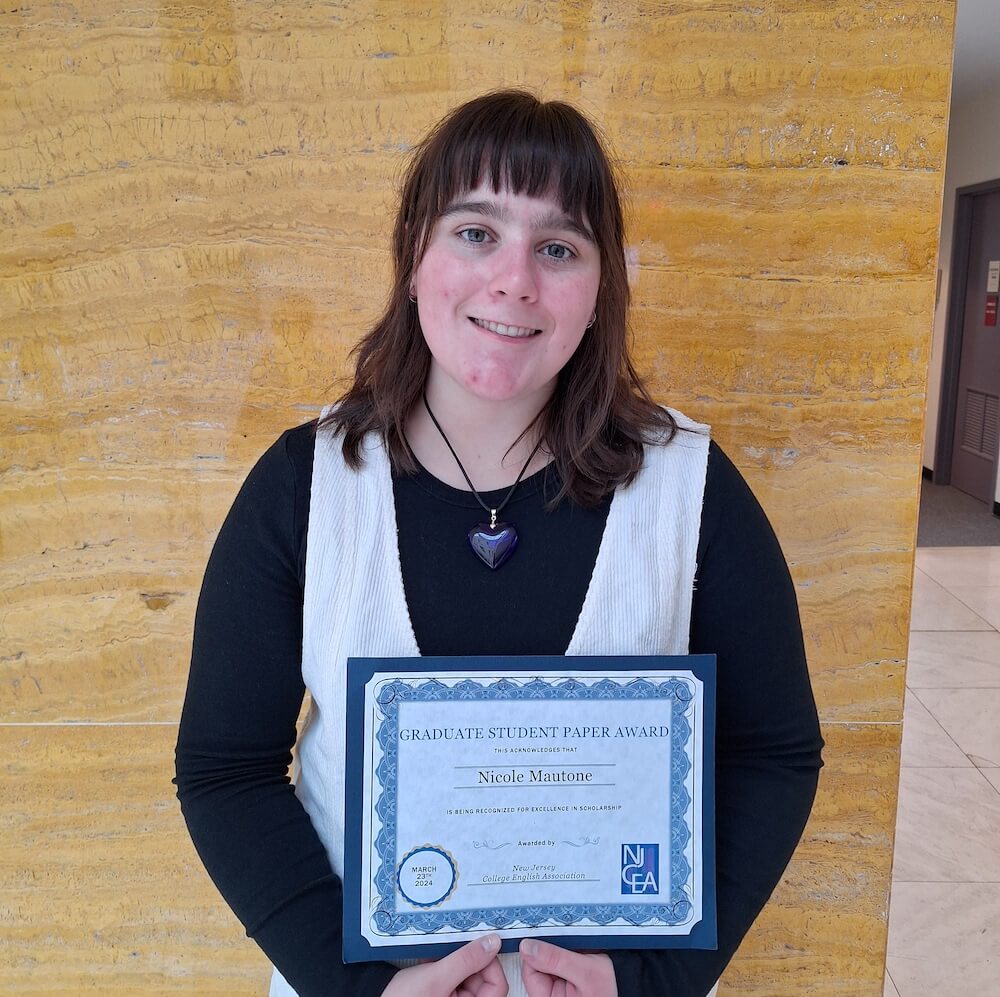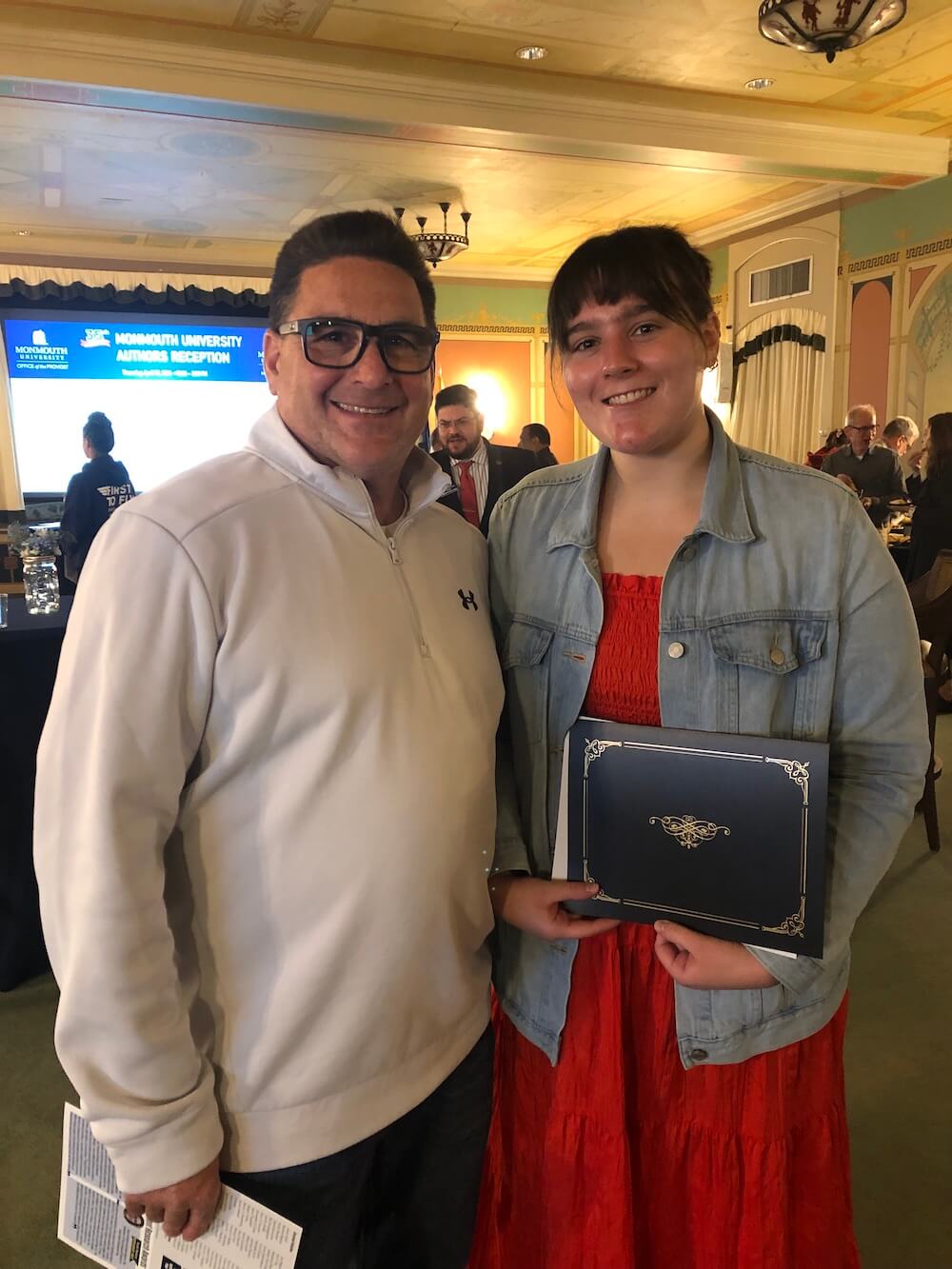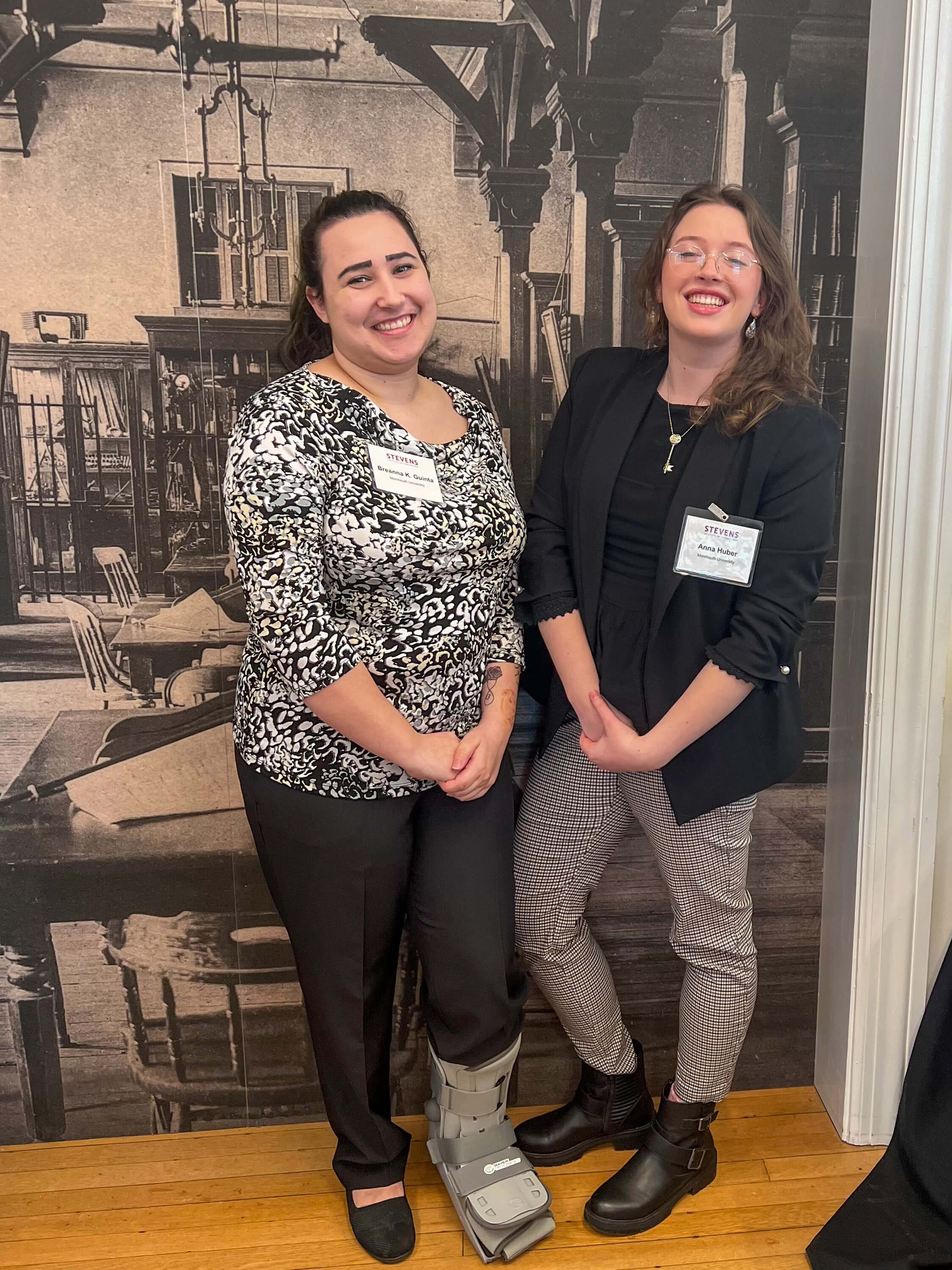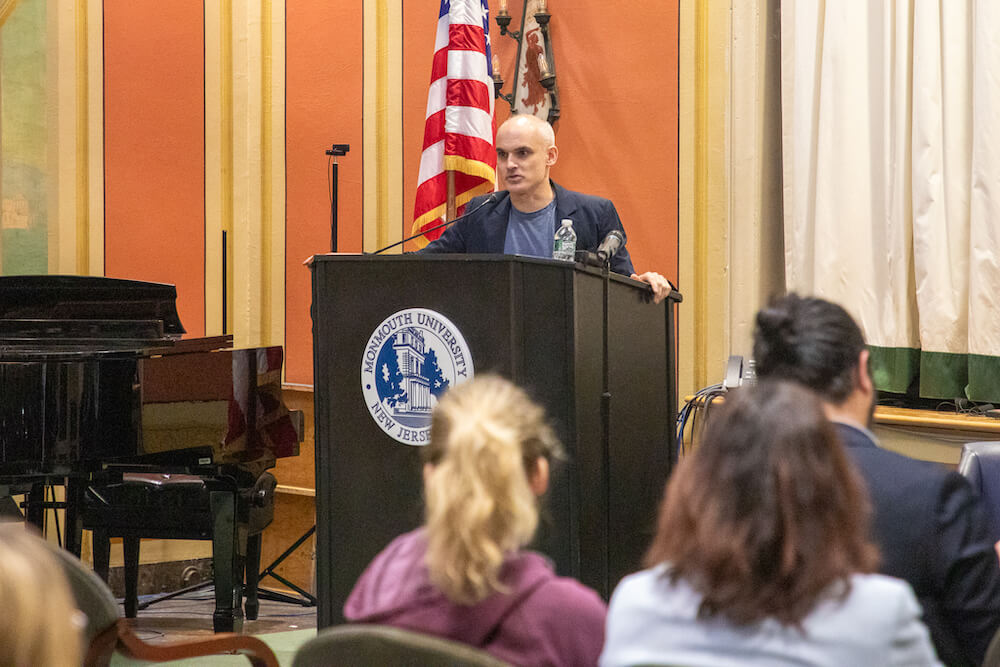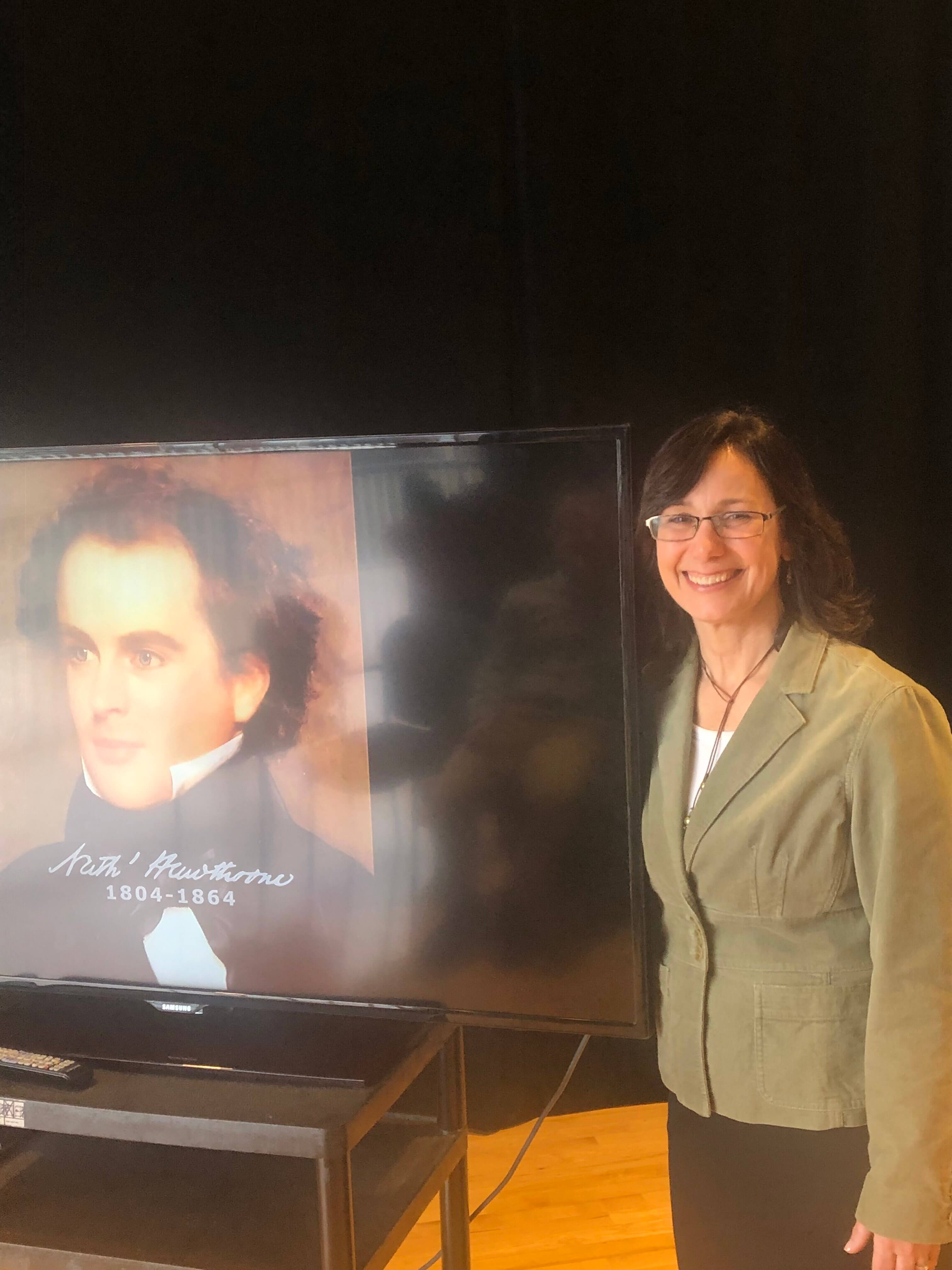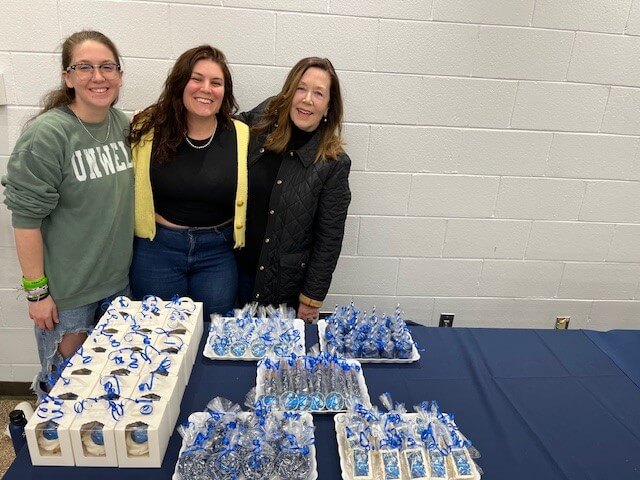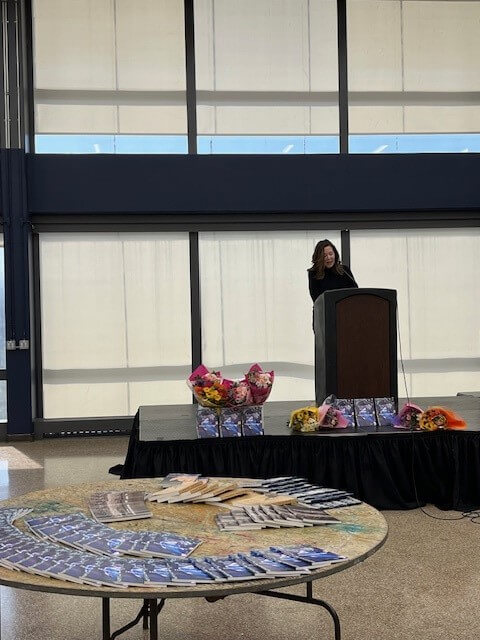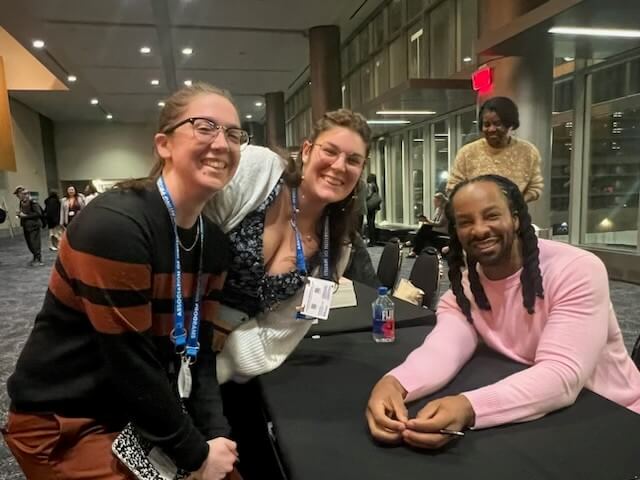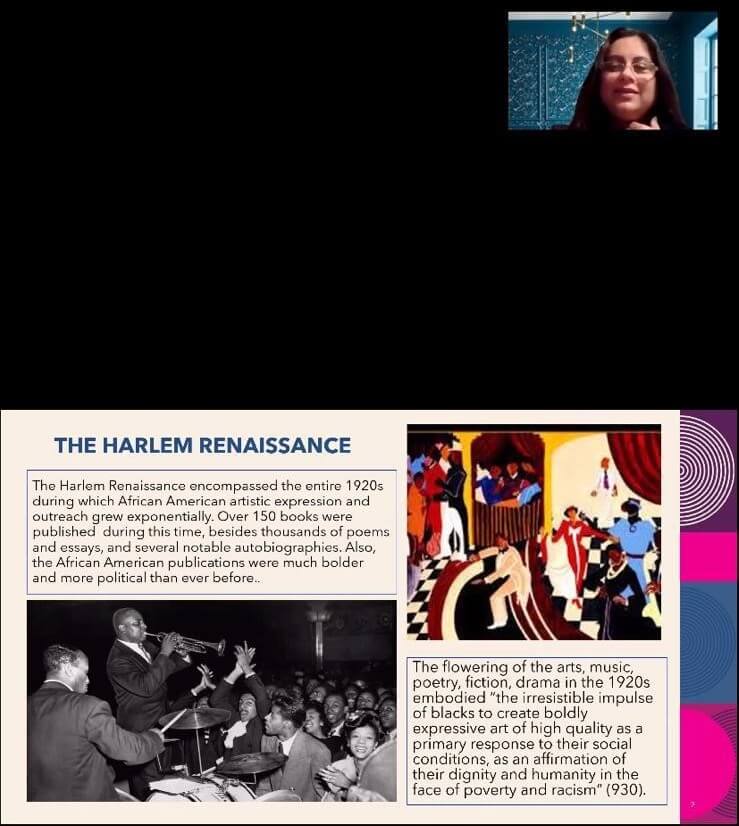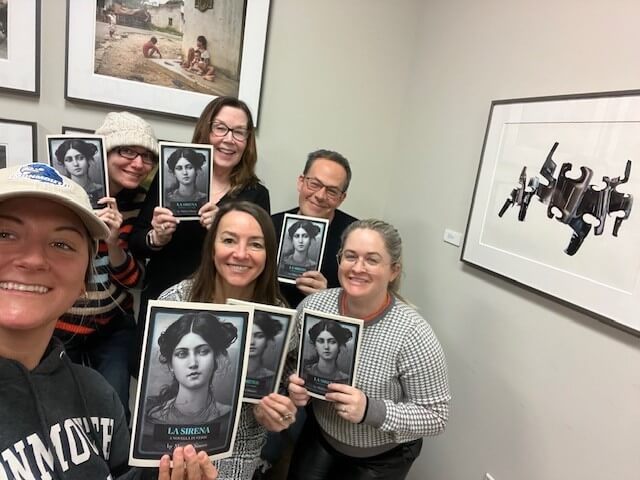Volume XIII, Issue II
Table of Contents
- Note from the Chair
- English Department Receives Grant for Workshop Series on Antiracist Literature Pedagogy
- English Department Celebrates “Community” for Fifth Annual Toni Morrison Day
- Celebrating Toni Morrison Day: Ross Gay’s Keynote Address
- Visiting Writers Series: Hernan Diaz
- Sigma Tau Delta Update
- Congratulations Sigma Tau Delta Members!
- Wit: A Collaboration of Art and Academia
- The Return of the Lowbrow, Middlebrow, Highbrow Series: Maria Farland, Ph.D.
- Alumna Spotlight: The Fulbright ETA Experience
- Department Student Achievements
- Faculty News
- Photo Galleries
Note from the Chair
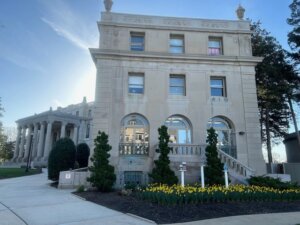
As this year-end edition of Words Matter makes apparent, the Spring 2024 semester has been an eventful one for the Monmouth University English department. As always, much of the credit goes to our department’s dedicated faculty and to our hardworking students, whose passion for the study of language and literature drives every- thing we do. That being said, I’d like to take the opportunity to acknowledge the fact that— particularly in today’s environment of con- strained budgets and declining support of the humanities—our faculty and students aren’t the only ones who deserve credit for this semester’s successes.
Unless you skipped reading the first page of this newsletter, you have already heard about our department’s workshop series on antiracist literature pedagogy. What you may not have picked up on was that this initiative was made possible by a generous grant from the Office of the Provost, the Intercultural Center at Mon- mouth University, and by additional funding assistance provided by the Office of the Dean of the Wayne D. McMurray School. We are highly appreciative of the key role played by all of these valued partners in supporting our efforts to foster more inclusive and antiracist pedagogical approaches to teaching general education literature at Monmouth.
As usual, a major highlight of the Spring semester was our fifth annual Toni Morrison Day celebration. By the time the all-day event culminated with an energetic, standing-room-only reading by the noted poet Ross Gay, it was apparent that this year’s edition of Toni Morrison Day had been our best ever, thanks in large part to the crucial support of the Intercultural Center at Monmouth University and the Office of the Dean of the Wayne D. McMurray School, the Leon Hess Business School, the School of Social Work, the Department of History and Anthropology, the Guggenheim Memorial Library, the Monmouth Review, the Sigma Tau Delta English Honor Society, and Project Write Now.
Another highlight of the just-completed Spring term was the April 10 Visiting Writers Series reading by Hernan Diaz, author of In the Distance (2017) and Trust (2022). It’s not every day that we’re able to bring a brilliant and thoughtful Pulitzer Prize-winning novelist to campus, and it wouldn’t have been possible without the involvement and investment of our partners, the Monmouth University Center for the Arts and the Intercultural Center at Monmouth University.
Finally, I would be remiss if I didn’t mention my favorite event of the academic year—our annual Student Awards Ceremony and Sigma Tau Delta Induction—and thank First-Year Advising for its annual support of the David Tietge Memorial First-Year Composition Awards, and Caryl and Charles Sills for their sponsorship of the $15,000 annual scholarship for outstanding English-Education majors that bears their names. Our thanks also go to a donor who has re- quested to remain anonymous but whose exceptionally generous recent gift to support the teaching of poetry at Monmouth has enabled our department to inaugurate a new “Brother Austen Poets-In-The-Classroom Series,” to provide more support for student travel to workshops and conferences, and to recognize more graduate creative writing students with prizes for their outstanding poetry and prose.
I’m proud of all that we—faculty, students, and friends/partners—have accomplished together, and I hope you enjoy reading about all of our goings on and, after that, have a wonderful and relaxing summer.
English Department Receives Grant for Workshop Series on Antiracist Literature Pedagogy
Anna Huber ’23 and Samantha Walton ’23
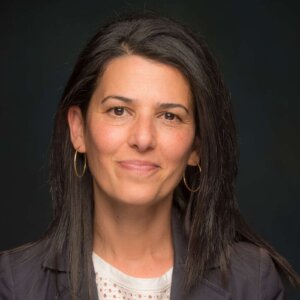
To the student body and all lovers of language, I am happy to report on a recent development in the Monmouth University English Department.
Three years ago, the University’s Office of the Provost and Intercultural center approved and developed the Diversity Innovation Grant (DIG) program, which allows departments across campus to apply for funding for initiatives that support the university’s goals of countering racism and increasing diversity and inclusion. As part of this program, the English department applied for and received a grant enabling them to bring in Sophia Sarigianides, Ph.D. from Westfield State University to host a series of Zoom workshops for professors about how to teach from an antiracist perspective.
Sarigianides is an expert in literature, race, and the classroom; her particular interests lie in the methods professors can employ to teach in antiracist ways in higher education. She was chosen to guest-speak by the University because of her recent publication, Letting Go of Literary Whiteness: Antiracist Literature Instruction for White Students. Sarigianides speaks frequently at predominantly white colleges and schools about how to teach canonical literature (which is often dominated by white
characters) in a way that is more inclusive.
One of her main strategies is to include counter stories to canonical texts. For example, the novella “Wide Sargasso Sea” by Jean Rhys which is a response to Jane Eyre that addresses the life of a colonized character who appears in the original novel but is largely overlooked in favor of the white protagonists. Doing so helps offer alternate views and opinions on topics and times covered by the lens of white writers. This idea helps diversify and challenge the canon of literature in constructive and meaningful ways. Another one of her goals is to equip professors with language and vocabulary necessary to facilitate critical conversations with students about race and literature.
According to Jeffrey Jackson, Ph.D. one of the purposes of hosting the Zoom lecture series was to validate and strengthen the efforts already made by the English and literature faculty to be more inclusive and teach with a focus towards antiracist ideas. Many professors already do their best to implement these ideas and practices in their classrooms, but hosting this lecture series helps affirm their efforts and supports professors in their continued efforts to support antiracism. I was able to sit in on one of Sarigianides’ sessions, and it was inspiring to see how professors worked together in the lectures to brainstorm ideas about how to teach different topics and canonical texts. Witnessing the attitudes of the professors in the session confirmed how willing and motivated our professors are to maintain an antiracist position and pedagogy in the efforts of creating a more diverse, understanding, and safe place for all students.
Thank you to Heide Estes, Ph.D., J.P. Hanly, Ph.D., and Jeffrey Jackson, Ph.D. who chose to initiate this workshop series, and to Sophia Sarigianides who agreed to speak to the faculty. Without their efforts this series would not have been possible! Of course, thank you to the many members of the English department who have attended the sessions in a resounding affirmation to maintain classrooms of inclusion and antiracist teaching.
English Department Celebrates “Community” for Fifth Annual Toni Morrison Day
Kia Womack
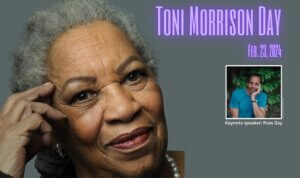
The Department of English at Monmouth University celebrated their fifth annual Toni Morrison Day with the theme of “community” on Friday, Feb. 23 in Pozycki Hall Auditorium. Students, faculty, and staff participated in different programs throughout the day, including faculty and student-led panels, a community discussion on Morrison’s Nobel Lecture, art and poetry contests, and a presentation from keynote speaker Ross Gay.
Toni Morrison was a novelist and essayist well known for her series of works that touched on racial injustices and the power of language. Morrison gained national attention for her novel, Song of Solomon (1977) and won the National Books Critics Circle Award. She also won the Pulitzer Prize for another novel, Beloved (1987). In 1988, Morrison was announced as the first African American woman to be awarded the Nobel Prize in Literature for her first novel, The Bluest Eye (1970).
“By co-sponsoring the event, we hope to amplify the impact of Morrison’s work on our community and empower attendees to engage with her themes of identity, race, and social justice.” Zaneta Rago-Craft, Ed.D., Director of the Inter-cultural Center, said. The Intercultural Center, as well as the Wayne D. McMurray School of Humanities and Social Sciences, School of Social Work, Leon Hess Business School, Department of History and Anthropology, Guggenheim Memorial Library, Monmouth Review, and Project Write Now took part in cosponsoring Toni Morrison Day.
Rago-Craft added, “By offering a diverse range of programming, we are now certain the program, now proudly in its fifth year, will engage attendees from various backgrounds and create a memorable experience that honors Morrison’s life and work.”
Toni Morrison Day opened with a panel on the Harlem Renaissance moderated by Joseph Torchia, M.A., with panelists Corey Dzenko, Ph.D., Ahba Sood, Ph.D., and Hettie Williams, Ph.D. Following was a discussion on Morrison’s Nobel Lecture that incited thoughts and ideas from students, faculty, and staff. It was moderated by Brittany Biesiada, Ph.D., Torchia, and Sood. Student panelists Kaitlin McGuire, Gabriella Petrillo, and Lincoln Pereira each gave presentations on Morrison’s novel, Beloved, moderated by Lynn Siracusa, Ed.D.
The winners for the Toni Morrison Day Digital Poster contest and Creative Writing contests were announced by the Monmouth Review and moderated by Jennifer Harpootlian, M.A., Mihaela Moscaliuc, Ph.D., and Kurt Wagner, Ph.D. The winners for the digital art contest were freshman Daniel Martin, senior Kiley Hubbard, and junior Jessica Taylor. Each won a $75 gift card, a certificate, and will have their posters displaced in the Guggenheim Memorial Library. The winners for the creative writing contest were Nicole Conti, senior, Taylor Williams, sophomore, and Kobi Sana, freshman, who each won $75 and presented their work to the attendees.
“We [Monmouth Review] wanted to give the winners of the contest the space to share and present their work, as well as encourage all students to submit their work for the contest. With this year’s theme being community, we wanted to bring the campus together and celebrate students’ writing,” emphasized Breanna Guinta, a senior English student and Vice President of the Monmouth Review.
Students from Asbury Park High School taking a creative writing course spent the day at the Toni Morrison Day program. One of the students, Robert Pennington, read aloud one of his poems titled “Life”.
The program ended with a presentation from keynote speaker Ross Gay. Gay is a poet, essayist, and professor at Indiana University Bloomington who was awarded the 2015 National Book Critics Circle Award, the 2016 Kingsley Tufts Poetry Award, and the PEN American Literary Jean Stein Award. Some of his works include poetry collections Catalog of Unabashed Gratitude (2015), Be Holding (2022), and essays, The Book of Delights (2019), Inciting Joy (2022), and The Book of (More) Delights (2023).
Gay read excerpts from his books and engaged in discussion with Moscaliuc on the significance of his work. The floor was opened to the Monmouth community who were able to ask questions and conversate with Gay. The presentation concluded with a book signing. “Toni Morrison Day really highlighted the transformative power of language and how it can be a tool to find joy,” junior English student Tim Pakrad, said. “The program underscores Morrison’s legacy with a fanfare of gratitude, praise, and attention.”
Mihaela Moscaliuc, Ph.D., Associate Professor in the Department of English and member of the Toni Morrison Day Committee, said, “It [Toni Morrison Day] brought us together as a community so we may learn and tend to one another. I would like to think that Toni Morrison would have been pleased with it.”
Reprinted with permission from Kia Womack, The Outlook Vol. 96 No. 17, published February 27, 2024
Celebrating Toni Morrison Day: Ross Gay’s Keynote Address
Veronique Manfredini
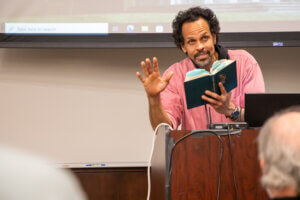
On Feb. 23, 2024, Monmouth University celebrated the fifth annual Toni Morrison Day. Standing as a testament to the power of literature and the lasting impact of an author whose work continues to inspire generations, the culminating session of the celebration saw Ross Gay as its Keynote Speaker.
J.P. Hanly, Ph.D. delivered a thoughtful opening address highlighting how Toni Morrison’s “works challenge us to examine our assumptions, to think about the social, ethical, and historical implications of how we use language, about the necessity of stories. And really, after having listened to all the presentations and the discussions today, [it was] hard for [him] to imagine another author whose example and whose writing would be more effective for inspiring a day that is dedicated to studying, celebrating, and discussing the power of language and literature in general and African American literature in particular.”
Following an introduction by Dorothy Doyle (Editor-in-chief of Monmouth Review) and Taylor Williams (winner of the Toni Morrison Day CW Contest), Ross Gay delivered a beautiful keynote address. Seamlessly transitioning from the poetry of basketball in Be Holding—painting a vivid portrait of the iconic moment when basketball legend Julius Erving, known as “Doctor J,” defied gravity with a breathtaking layup during the 1980 NBA Finals—to the realm of literature, he shared his reverence for Morrison’s work. Gay delved into a discussion of the writers who had profoundly impacted his perspective, citing John Edgar Wideman, Herman Melville, Jamaica Kincaid, and, of course, Toni Morrison herself. “The Bluest Eye changed my life, of course, but also her nonfiction,” he mused, paying homage to Morrison’s insightful commentary on American literature and the complexities of race and identity.
A Q&A with the poet followed the reading of several essayettes, a form Gay coined with the publication of his collections A Book of Delights and A Book of (More) Delights; among the most memorable were “The Door” and “Throwing Children.” Audience members asked thoughtful questions about the power of joy in times of crisis, as well as about craft and inspiration, and this generated an insightful conversation. The poet talked about the ethics of celebration and stated that “even in sorrow we celebrate,” inviting the audience to find joy amidst the chaos of life. Gay remembered his friend and late poet Gerald Stern who understood this delicate balance between sorrow and celebration. In his poems, Stern spoke of forgiveness, of loving “lowness,” and of finding beauty amidst destruction, reminding us that rage, while powerful, can dissipate when we extend our hand in compassion, even to a small beetle. The event was followed by a book signing of Ross Gay’s poetry books.
Visiting Writers Series: Hernan Diaz
Jenna Lozzi
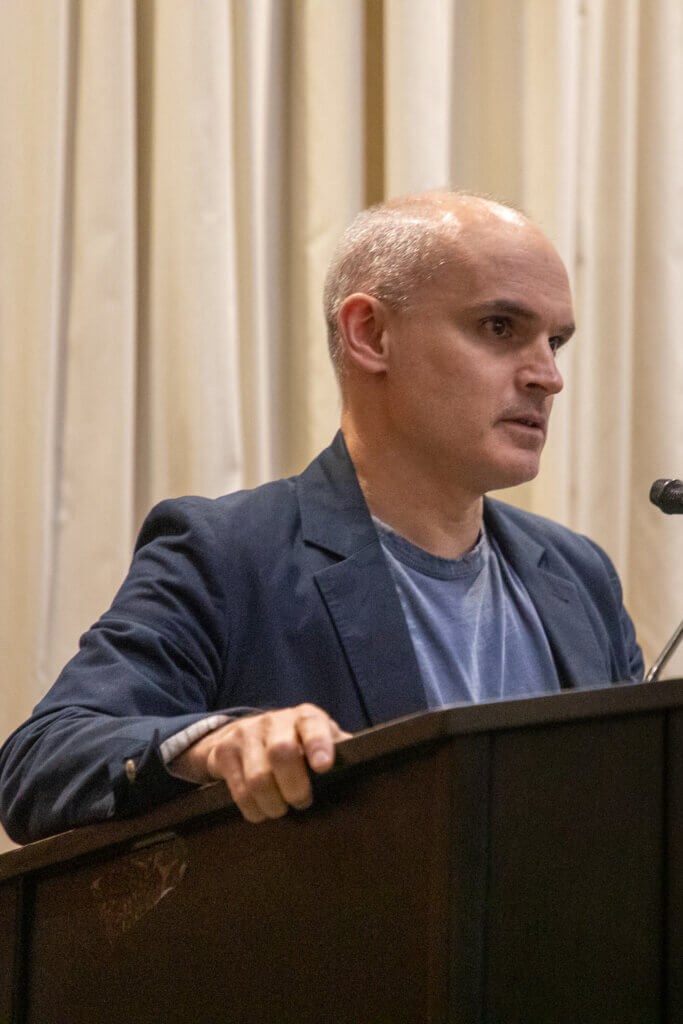
On April 10 as a part of Monmouth University’s Visiting Writers Series, students were able to meet and listen to award-winning author Hernan Diaz read from his novel “Trust”, the 2023 Pulitzer Prize winner for Fiction. Diaz was previously nominated in the 2018 Pulitzer Prize for Fiction for his debut published novel “In the Distance”. This distinction of having multiple nominations is rare amongst authors, with only three other individuals being repeat nominees in the past 20 years.
Hernan Diaz was born in Buenos Aires, Argentina and moved to Sweden with his family in early childhood. He and his family returned to Argentina later in life. Diaz possesses a B.A. in Literature from the University of Buenos Aries, an M.A. from King’s College in London, England, and a Ph.D. from New York University in NYC, New York.
“Writing for me begins with reading,” Diaz explained when talking about his creative process. Diaz is faithful to research and encouraged listeners to go beyond a Google search for information. He emphasized the value of spending time in libraries and archives where writers can gain exposure to knowledge that is not widely accessible from the internet so as to provide readers with a unique, stimulating experience.
Advice on how to stand out as a writer that does not sound cliché or hackneyed is rare to come by, and even rarer to trust its infallibility. But the words of Diaz are truly those of a singular writing talent who is far from the finish in terms of his contribution to the great American literary canon.
“Trust” is a metafictional novel comprising of four individual books. “Any time we read anything we are entering a tacit agreement with that text,” Diaz elaborated in recounting the background for writing the novel. Trust requires of its readers that tacit agreement, that faith in reading the story as told from different character points of view in order to get to the heart of the struggle of wealth and power, of voice and voicelessness, where the truth idly lies in wait.
Sigma Tau Delta Update
Olivia Frew and Hanna Vozzo
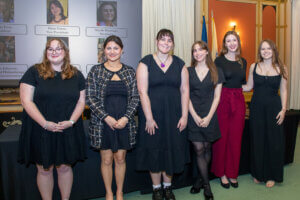
This year, the goal of the eBoard was to try and bring Sigma Tau Delta back to what it had been before COVID-19. We wanted to get members involved, to create a community of English majors who came together not just because of an organization, but from the shared love of this discipline, too. Our task, then, was to create as many opportunities for members to get together as possible.
We started the fall out strong with “Thinking of Earning Your M.A. or Dual-M.F.A. Degree at Monmouth University?” where students who were considering Monmouth for graduate school were able to learn from and ask questions of current Monmouth graduate students. In December, we held “Ghost Stories in the Great Hall” with the Social Writerly, run by two amazing Monmouth alumni Jamiee Cali and Sarah Van Clef. Also, during this time, we raised money through the Halloween bake sale and the Double Good popcorn fundraiser and collected over 150 books to donate to children battling cancer through the Frances Foundation.
We kept things going in the spring with the hit event “Blind Date with a Book.” We really put the “lit” back in literature, because every single book that was wrapped had found a new home amongst the members of Monmouth University. Keeping with books, we hosted a Toni Morrison Day appetizer book club, during which students and faculty came together under the insightful moderation of Jeffrey Jackson, Ph.D. to discuss the member-picked Beloved. Members then joined the activities of Toni Morrison Day that Friday. Some events endorsed by Sig Tau this semester were the Social Work club’s Banned Book Event, The Scarlet Letter on stage in Red Bank, and the Visiting Writers Series with Hernan Diaz. Our fundraisers included Philly Pretzel Factory and Double Good popcorn, and along with the fall fundraisers, we were able to raise over $2700, and part of those funds will go to a memorial honoring Prescott Evarts, Ph.D., David Tietge, Ph.D., and Margaret Del Guercio, Ph.D.
Last but not least, we had the opportunity to celebrate our new members at the induction ceremony. These wonderful, talented English students show promise for the next generation of Sigma Tau Delta, and we are beyond thrilled to see where they will take the organization in the future. With many of the eBoard members graduating, we know that the students who step into those roles next year will pick up where we left off, bringing Sigma Tau Delta back and beyond its pre-COVID glory.
Congratulations Sigma Tau Delta Members!
Congratulations to Our Growing Sigma Tau Delta Family
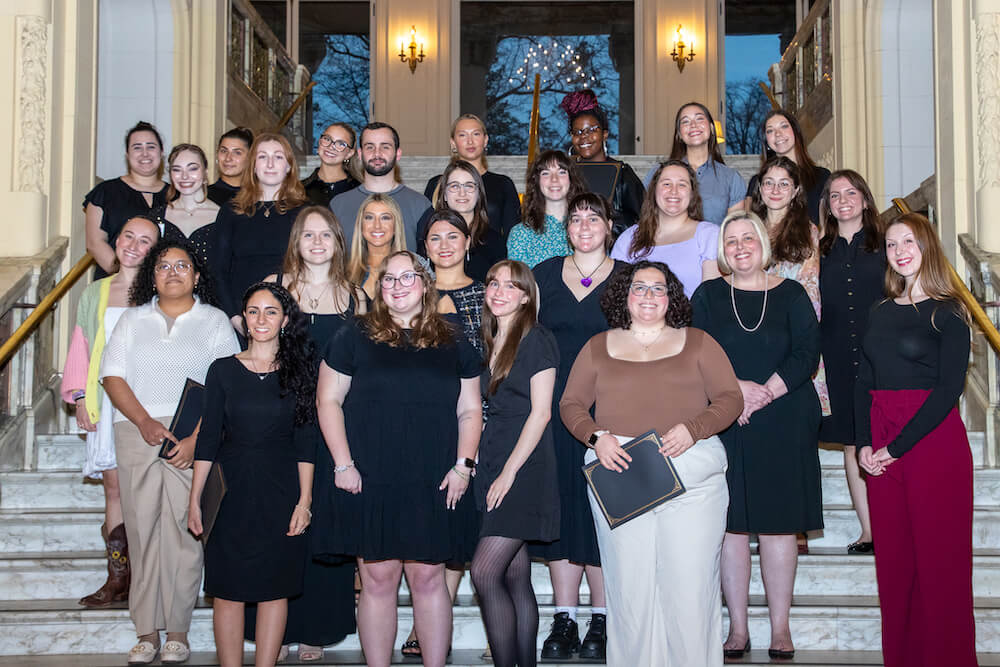
Spring 2024 Inductees
- Lauren Bevacqua
- Natalie DellaRagione
- Zachary Mayer
- Taylor Memoli
- Jessica Propst
- Olivia Puzio
- Meghan Reilly
- Sabine Saavedra
- Isabella Sorrentino
- Juliette Tordjman
- Kia Womack
Fall 2023 Inductees
- Jillian Bodiford
- Melaina Carrara
- Lauren DeFelice
- Zafira Demiri
- Ava George
- Breanna Guinta
- Amera Hemming
- Ceciliah Leininger
- Gabriella Petrillo
- Kristi Sabroe
- Samantha Saoud
- Megan Sternberg
Congratulations to Our May 2024 Graduates
- Coral Barrett
- Faith Bates
- Carolyn Cid
- Grace Cotogno
- Zafira Demiri
- Madison Ducsai
- Olivia Frew
- Brooke Ganz
- Kathryn Hawkenberry
- Amera Hemming
- Kaylee Johnson
- Juliana Kaufman
- Ceciliah Leininger
- Peyton Livermore
- Megan McCafferty
- Carlee Migliorisi
- Jennifer Rivera
- Kristi Sabroe
- Mary Schuld
- Megan Sternberg
- Hana Vozzo
- Samantha Walton
Wit: A Collaboration of Art and Academia
Ceciliah Leininger
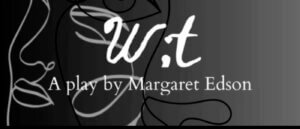
From February 29 through Sunday, March 3, the Department of Music and Theatre Arts Production at Monmouth University presented their production of the 1995 Margaret Edson play, Wit. The play tells the story of Dr. Vivian Bearing, an English professor who has spent years studying the metaphysical poetry of John Donne. The show follows Vivian through her terminal ovarian cancer diagnosis, causing her to reexamine her life and memories.
Senior Specialist Professor Sheri Anderson was the artistic director for the production. When asked why she decided on Wit for this year’s spring play, she stated, “I’ve wanted to direct the show for years, but it is a very emotional piece that requires heavy acting chops. We currently have an incredibly talented
group of theatre students, so it just felt like the right time.”
Brooke Tortorelli, a senior mathematics and musical theater student, played the lead role in the show. She said of the play that “it was a masterclass in storytelling” and that “it was [her] dream to be able to convey a narrative with such great nuance and command of words.” When prompted how her own experiences shaped her performance, she responded, “Vivian is not really the type of person who wears her heart on her sleeve, and in my past, I have not been the most emotionally expressive person in my personal life. I have never considered myself to be a particularly strong person, but through this role, I have learned that we tend to underestimate how strong we really are.”
This production was particularly special because of its collaboration with Monmouth’s English and Biology departments. Sue Starke, Ph.D., Associate Professor in the Department of English, said of her and Tortorelli’s partnership, “Brooke and I had a lengthy and wide-ranging conversation about her role and [John] Donne’s importance to it. She had two scenes where she had to recite poems, which links thematically to her chemotherapy ordeal and to her human awareness of her pending death.” Dottie Lobo, Ph.D., Professor and Chair of the Department of Biology, and the students in her cancer biology course also worked with the actors. She added, “After the show we were able to interact with the actors during the talk-back, and it was very impactful for me to hear how much of their own experiences with cancer patients and serious illness drove their acting during the performance. In the cancer biology course, we have been studying the molecular mechanisms of cancer and the treatments used. The ability for my class to see this production added a human dimension to their study of the disease. The reason that we study the biological mechanism is ultimately to impact humanity.”
On the topic of her collaboration with these departments, Tortorelli stated, “As they say, it takes a village, and that certainly holds true for my fulfillment of this role. I needed to gain a basic understanding of the poetry of John Donne since Vivian is a scholar of seventeenth century poetry. Therefore, I had a great discussion with Starke about the subject.” She continued, “I also had the privilege of working with Patrick Walden and graduate students Devon and Victoria in the Department of Speech-Language Pathology so I could acquire the necessary tools to talk for extended periods of time.” Of the play’s director, Tortorelli expressed, “Professor Anderson has taught me so much, not only during this production but also during the entirety of the past three years. I would not have been able to do any of this without her, and I am so grateful that she trusted me with such a strong, important character.”
The Return of the Lowbrow, Middlebrow, Highbrow Series: Maria Farland, Ph.D.
Zafira Demiri

In the beginning of March, Maria Farland, Ph.D. joined Kristin Bluemel, Ph.D.’s evening graduate class on British and Irish modernism to deliver an incredibly insightful lecture titled “Yankee Agrarian: Robert Frost, the ‘Degenerate’ Farmer, and the Elevations of the Rural Mind.” Although Frost is a quintessential American writer, Farland’s work is relevant to many literatures of the modernist period and extends to the modern-day contexts of our society.
In her research, Farland investigates Frost’s depictions of the anti-pastoral and the “degenerate” farmer that both plays to and refutes this distasteful trope. Poems like “Mending Wall” directly represent the negative stereotypes of “rural savage” in a historical context of communal and social upheaval as well as prejudice against rural dwellers—even exposing a historical tendency to eugenics that urban society used to discredit farmers.
Frost wrote North of Boston as a response—not only as a well-loved writer forging a path between lowbrow and highbrow literature, but as an avid farmer and agriculturalist trying to navigate the expanding sphere of agricultural science that was quickly blending the rural and the urban world. In his work, he evokes the antipastoral through a depiction of natural landscape divided by uneven development; fondly remembering the past while embracing modern advances in agricultural science, commenting on the environmental destruction and enhancement that came with agricultural industry.
Frost discounts the image of the “degenerate farmer” by playing to the trope: both gesturing to and refuting the idea that rural areas were in need of reform. He depicts the fully-developed rural mind to be just as advanced, if not more, than the urban mind given its capacities, creativity, and mental astuteness that could only be curated through rural lifestyle.
Farland accurately represents this middlebrow path Frost takes as a bridging of two worlds and a recognition of the undervalued qualities of lowbrow culture, removing its negative connotations. This lens helps contemporary readers to better understand the richness of rural problems and concepts using literature and cultural history. As we all know, literature often holds the key to better understanding one another—giving each other grace. In a time where there is a great social divide between “highbrow” and “lowbrow”—urban and rural—we should all resolve to a middle-path that recognizes accurately the intricacies Frost expands upon.
Alumna Spotlight: The Fulbright ETA Experience
We are so proud to have two recent Fulbright English Teaching Assistant (ETA) Award recipients among our faculty. We asked them to participate in a brief Q&A about their experience.
Brittany Scardigno ’21M (South Korea, 2022-2023)
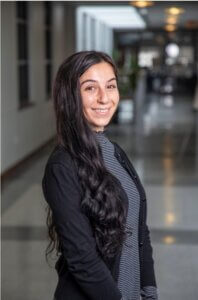
What did you find most appealing about the Fulbright program?
I think the most appealing part about the Fulbright program was that it held the opportunity to experience something completely new while also knowing you have a support system. Change is scary, and it’s comforting to know you’ll have people near and far to help you when you need it.
Why South Korea?
I mostly grew up around Korean culture, and many of my friends are Korean, both native and Korean-American. Witnessing their mothers go through the process of moving to a foreign country and building their lives up from the ground was inspiring. It made me aware of how intense the assimilation process is, particularly when moving to a foreign space where both the culture and language are vastly different.
What was your biggest culture shock?
I think the biggest culture shock was how different South Korea’s education system is. The focus is solely on students taking and passing the CSAT exam,
which is Korea’s version of the SAT. The students spend pretty much their entire education career preparing for this one test and spend quite a lot more time
studying than American students. So, it’s pretty normal for students to fall asleep during classes because they’ve been up until 3 in the
morning studying at tutoring centers.
What is your fondest memory of your year abroad?
This is a hard question, there are so many fond memories. If I had to pick the fondest, I would have to say the Temple Stay. I traveled into the mountains to Seonunsa Temple where I slept, ate, and participated in spiritual practices for about four days. My time there was mostly spent walking around the mountains, exploring the waterfalls and historical shrines carved into the sides of the rocks. My stay there will always hold a special place in my heart, along with a great friend I made while there, Miss Hena Kim; she’s one of the most wise women I’ve ever met and I look forward to visiting her soon.
Do you have any advice for future applicants?
If it was easy, everybody would do it. The application process is a tough one, but I do think it’s necessary. It’s a big change, and life at home doesn’t stop when you’re overseas.
Faith Bates ’22M (Romania, 2024-2025)
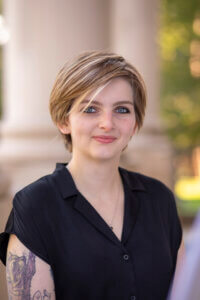
What did you find most appealing about the Fulbright program?
I wanted to experience living in another country, and not just as a tourist. The Fulbright program was appealing to me because it prioritizes cultural exchange and provides a year of funding to build international connections. And I won’t lie—Fulbright is a prestigious program with a strong network base. I was also drawn to the opportunities it might open to me, both now and in the future.
Why Romania?
In my graduate literature classes, I was introduced to Romanian culture through pieces of literature, and since then I’ve been fascinated by many of the recent social developments in Romania. I’m particularly interested by the rapid reform in education since the fall of the communist regime. I hope to experience and gain understanding about how this has shaped the arts and humanities as well as student learning.
Can you describe your application process?
It was intense! There are a number of different components to the application. The review process relies very heavily on applicants’ written statements, so I spent a lot of time and effort writing and revising those. This was my third year were applying, so each year I was able to hone and improve my statements. I was also fortunate to have several very generous recommenders who kind of enough to write me recommendations over the years (you need three for an application). Most importantly, as my Fulbright Program Advisor, Mihaela Moscaliuc continuously helped me with every step of the process in all three applications.
What are you looking forward to the most about your upcoming trip?
I’m most excited to meet people—particularly students and other educators in Romania—and I’m looking forward to learning about the culture and engaging with the local community in a meaningful way.
Do you have any advice for future applicants?
Don’t be discouraged by rejections. If you apply but aren’t recommended that cycle, don’t let that stop you from applying again (and again). It can be really disappointing, especially after all of the work and time you put into the application, but if the Fulbright program is truly an experience that you’re passionate about pursuing, keep applying.
Department Student Achievements
Congratulations to the Recipients of the 2023-2024 Awards
We’d like to extend our thanks to our guest judges for the Graduate Creative Writing
Awards, Maurya Simon (Poetry) and Rachel B. Glaser (Prose).
- The English Award for Academic Writing: Hana Vozzo
- The English Award for Creative Writing in Prose: Melaina Carrara
- The English Award for Creative Writing in Poetry: Olivia Frew
- The English Merit Award: Zafira Demiri
- The English Award for Graduate Study: Carlee Migliorisi
- The English Award for Graduate Creative Writing in Prose (Spring 2024): Nicole Mautone
- The English Award for Graduate Creative Writing in Poetry (Spring 2024): Veronique Manfredini
M.A. Theses Defended
- Carolyn Cid, A Mother’s Love. Spring 2024. Distinction.
- Samirah Sartor, “Unseen Affections: The Caregiver Figure in the Novels of Jane Austen.” Spring 2024. Distinction.
- Samantha Walton, “Cultural Literacy vs. Cultural Attentiveness: Intertextuality and Interpretation in Hamlet.” Spring 2024.
Congratulations to our graduating M.F.A. in Creative Writing students:
- Faith Bates ’22M, Terror, Avant-garde. Spring 2024.
- Jen Rivera ’23M, Salvation. Spring 2024.
Congratulations to Seniors Olivia Frew and Hana Vozzo who are graduating in May with Departmental Honors.
Further Achievements
- Congratulations to the winners of the Toni Morrison Day (TMD) competitions!
- TMD Creative Writing Contest: Nicole Conti, Kobi Sana, and Taylor Williams.
- TMD Digital Poster Contest: Kiley Hubbard, Daniel Martin, and Jessica Taylor.
- Graduate students Morgan Kelly ’22, Veronique Manfredini and Jen Rivera ’23M attended the Association of Writers & Writing Programs (AWP) Conference in Kansas City, MO in February.
- Graduate students Anna Huber ‘23 and Nicole Mautone ’24 presented at the NJCEA 46th Annual Conference in March.
- Nicole Mautone was also the recipient of the 2024 Undergraduate Library Research Award and received an honorable mention for the 2024 Monmouth University Honors Council Award for Best Honors Thesis/Capstone for her project.
- Graduate student Jen Rivera ’23M contributed to the chapter on Shakespeare’s tragedies within “VII Shakespeare,” published in The Year’s Word in English Studies, Volume 102, Issue 1, 2023.
- Graduate student John Vurro ’23M will have an essay, “Guardians,” published in The Sun in June.
- Alumnus Tony Clark ’23MFA will have an excerpt from his M.F.A. thesis, “The Gallery,” published in the Soundings East Literary Journal this spring. Clark will attend the Martha’s Vineyard Institute of Creative Writing in June as a recipient of the Poet & Author Fellowship.
Faculty News
- Faith Bates ’22M was awarded a 20242025 Fulbright U.S. Student Program Award to Romania.
- Stanley Blair, Ph.D., gave a series of lectures in the local communities. The Township of Ocean Historical Museum welcomed Blair in February for the lecture, “The Infamous Long Branch Murder of 1860, Solved.” In late March, Blair was invited by the Middletown Township Historical Society to present the lecture, “The Literature of Sandy Hook.” Blair was also the guest speaker at the English Student Awards and Sigma Tau Delta Induction Ceremony held in The Great Hall Auditorium on April 11, 2024.
- Dean Kris Bluemel, Ph.D., Interim Associate Dean of the Wayne D. McMurray School of Humanities and Social Sciences, and Wayne D. McMurray and Helen Bennett Endowed Chair in the Humanities, reinstated the Lowbrow, Middlebrow, Highbrow: Interventions in Cultural Study lecture series.
- Heide Estes, Ph.D.’s book, “Writing the World in Early Medieval England”, co-written with Nicole Guenther Discenza was published in September (Cambridge University Press, 2023).
- Heide Estes, Ph.D., Jeffrey Jackson, Ph.D., and John P. Hanly, Ph.D., Chair, collaborated to develop the English department’s proposal for the Diversity and Inclusion Grant program.
- Congratulations to Mihaela Moscaliuc, Ph.D. on being recommended for Promotion to Professor. Moscaliuc was a panelist for the “Getting Non-Writers to Write: Teaching Outside of the English Department” event held during the 2024 Association of Writers & Writing Program (AWP) Conference in February.
Moscaliuc’s EN-451 and EN-609 courses hosted “The Brother Austen Poets-in-the-Classroom Series.” Poets Jessica Jacobs, Maurya Simon, Janine Joseph, Claudia Serea, John Hoppenthaler, and Michael Waters visited the classes during the Spring 2024 semester and discussed their work. - Congratulations to Brittany Scardigno ‘21M. Scardigno, an adjunct professor, completed her Fulbright assignment in South Korea in December 2023. She has accepted a position as an immigration service officer in California.
- Abha Sood, Ph.D., Corey Dzenko, Ph.D., and Hettie Williams, Ph.D. shared their research on The Harlem Renaissance as the opening event of the Toni Morrison Day program on Feb. 23. Sood, Dzenko, Williams and Jonathan McElroy, Ph.D., reconvened for the virtual panel discussion, “The Harlem Renaissance: A History of African American Art & Culture,” hosted by the Long Branch Free Public Library on February 26, 2024.
- Lisa Vetere, Ph.D., led a pre-show event, “Context and Conversations for The Scarlet Letter,” at the Two River Theater in Red Bank on Feb. 17. Vetere’s discussion was followed by an adaptation of the Nathaniel Hawthorne’s novel, The Scarlet Letter, performed on stage.
Photo Galleries
Toni Morrison Day 2024
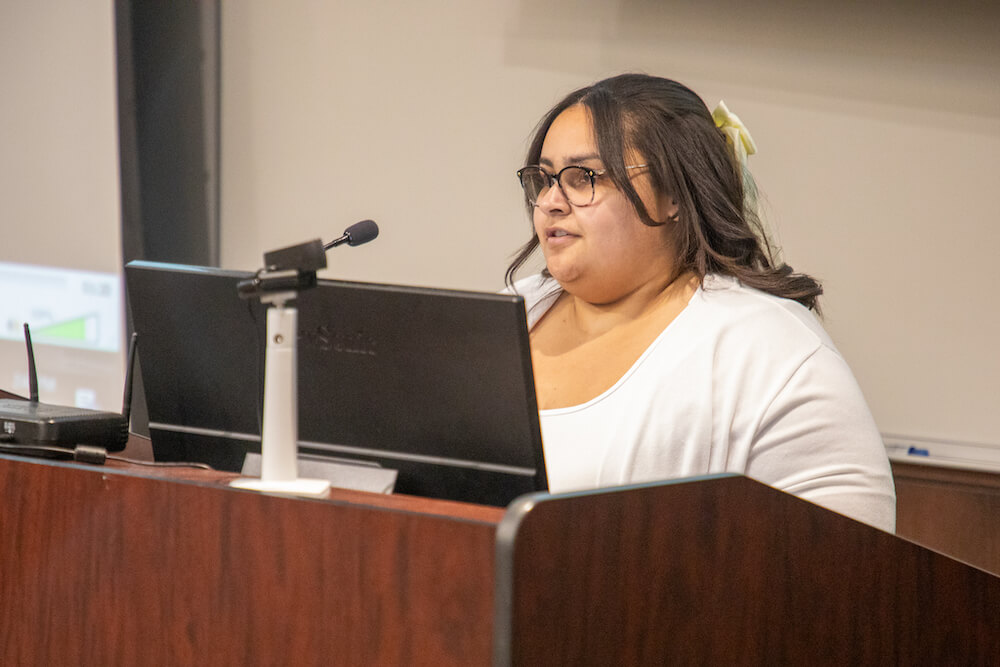
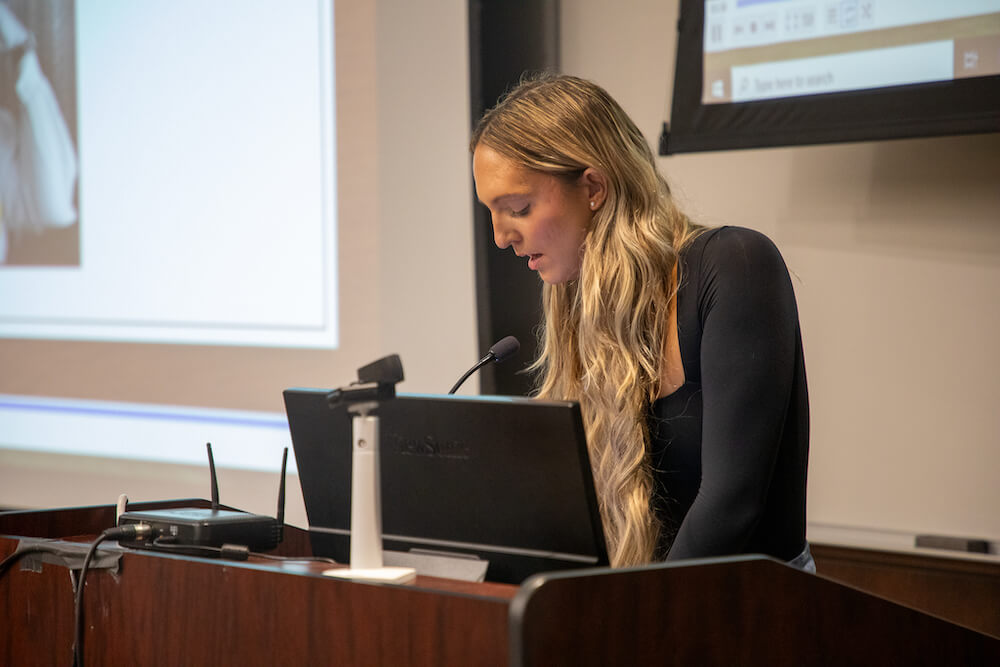
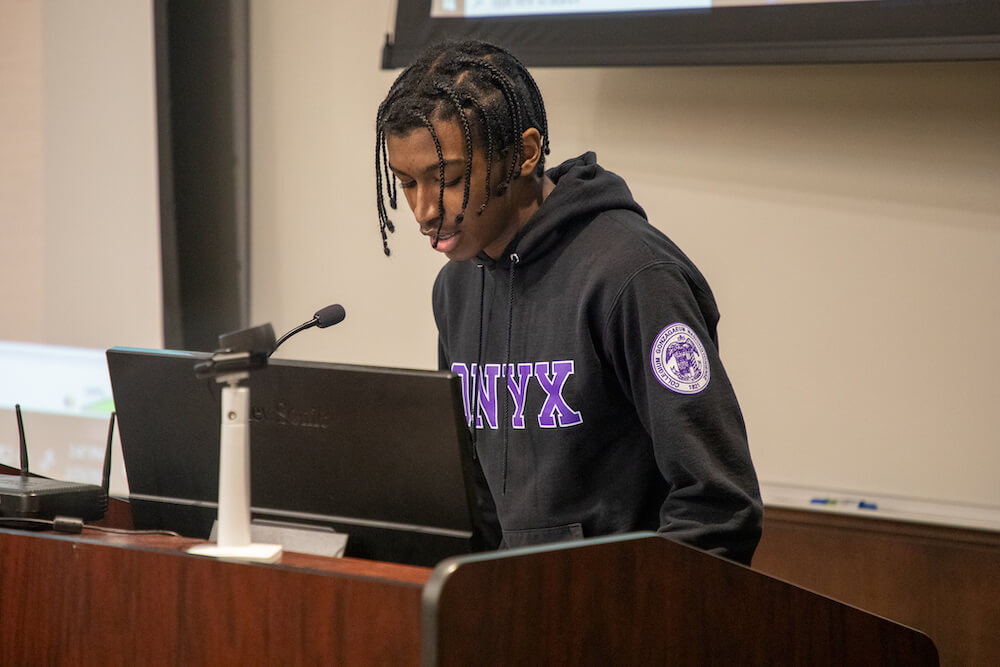
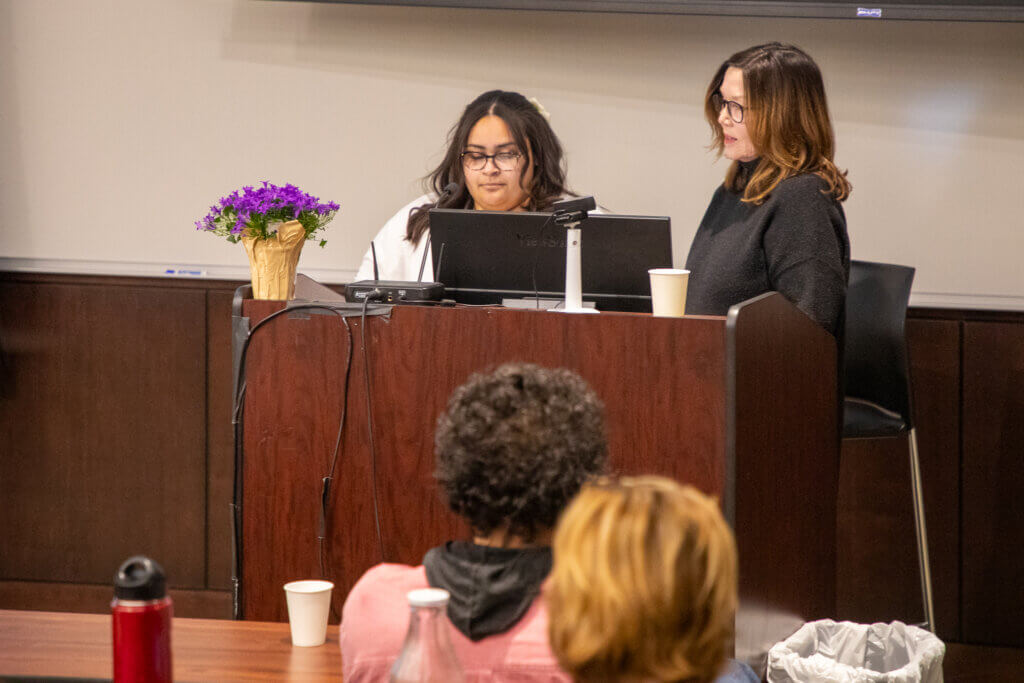
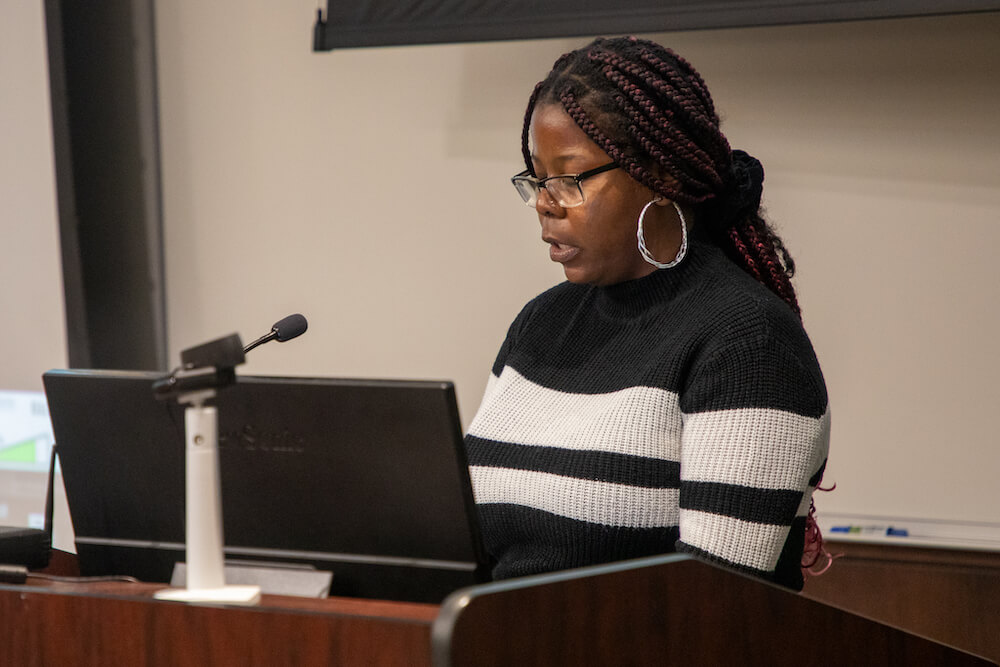
Morrison’s poems during the Monmouth Review presentation
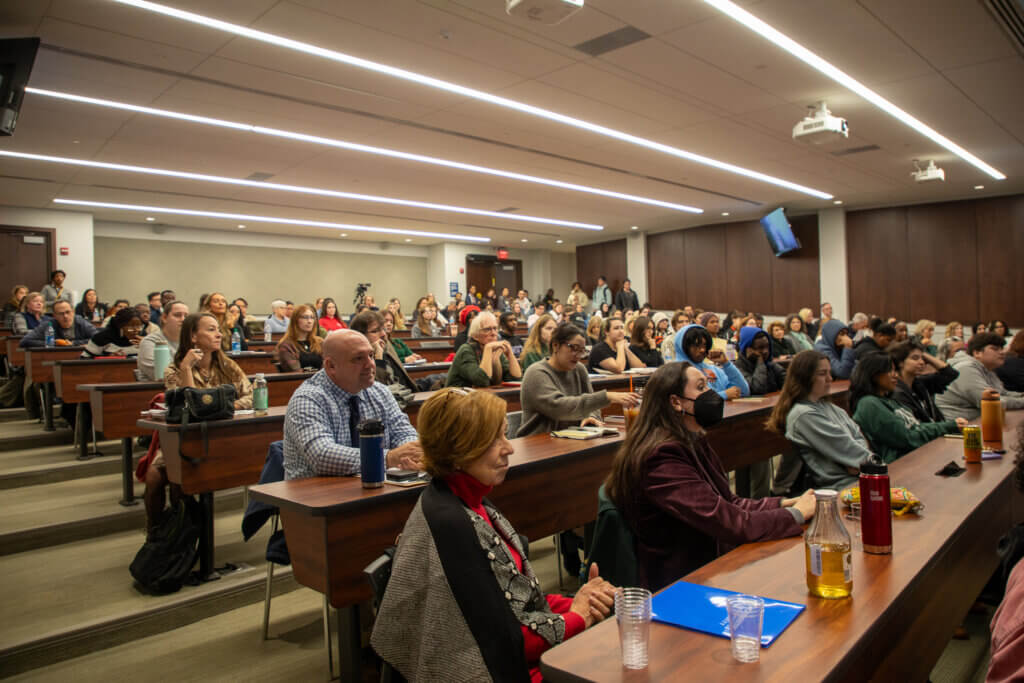
reading in Pozycki Auditorium
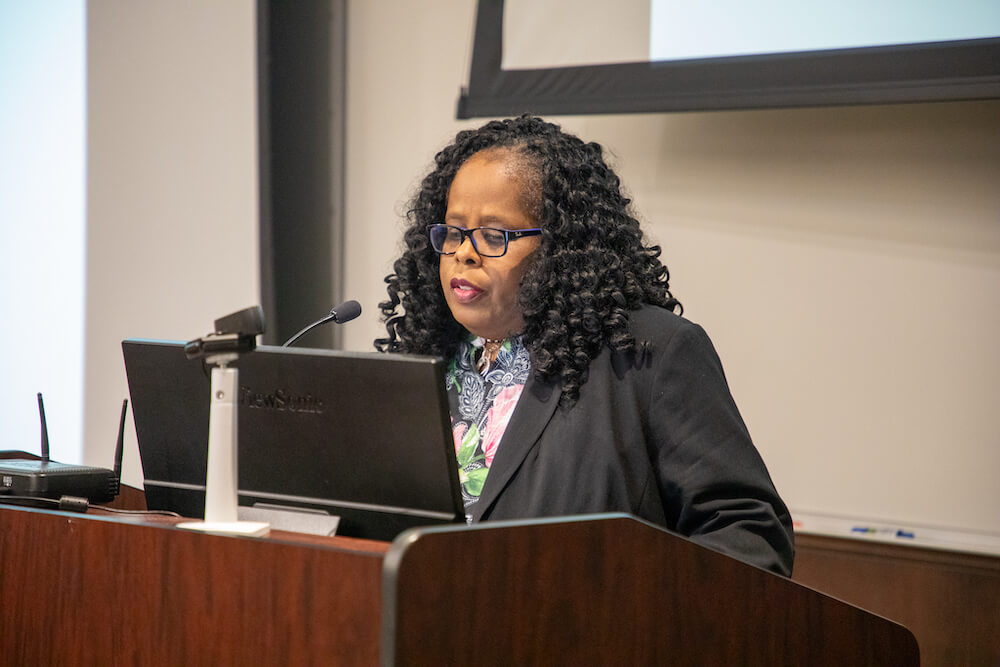
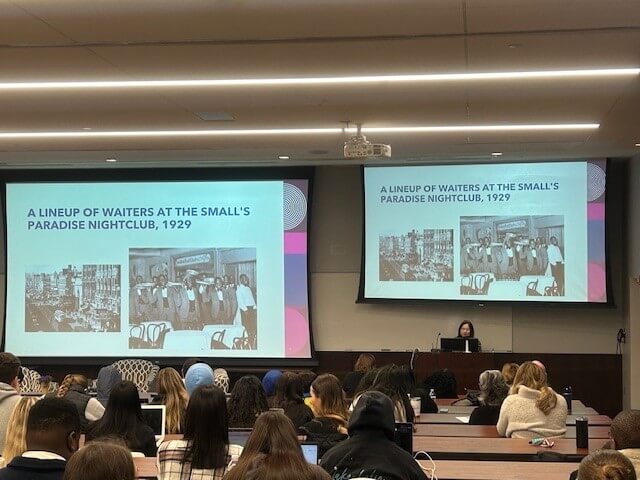
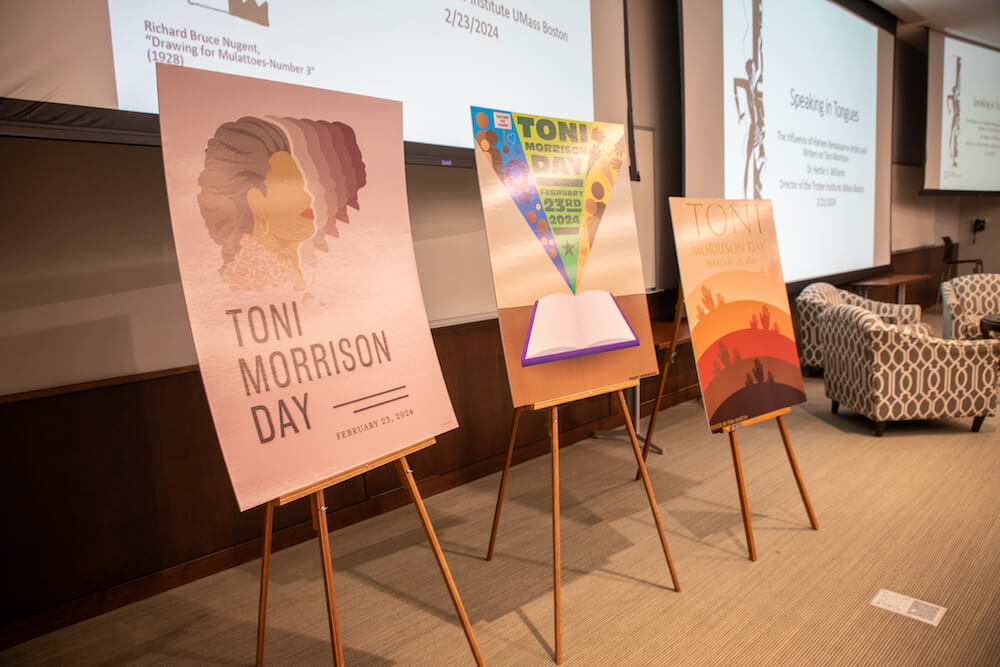
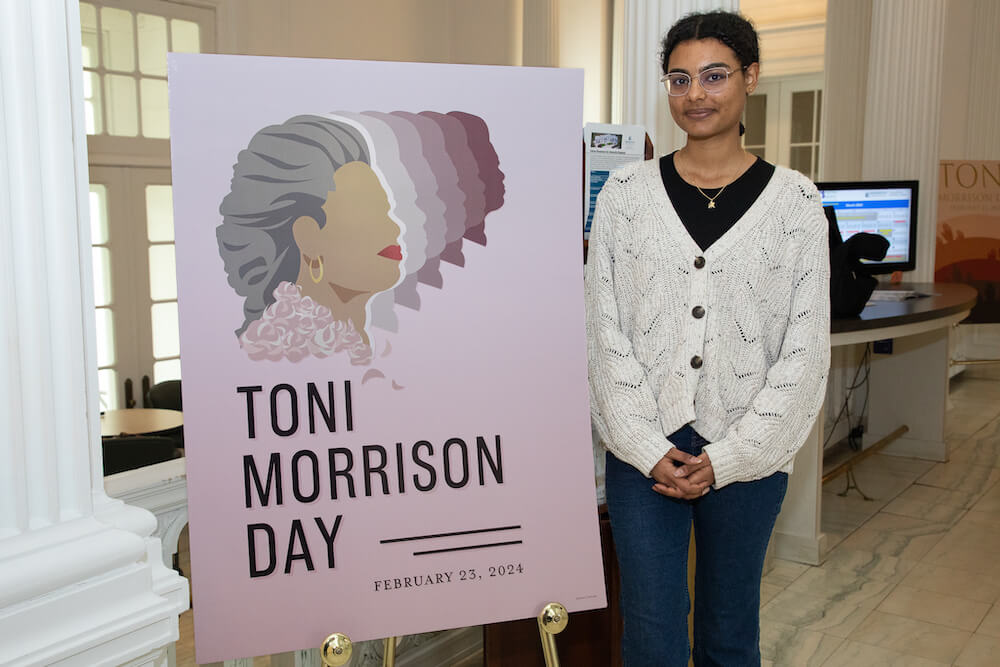
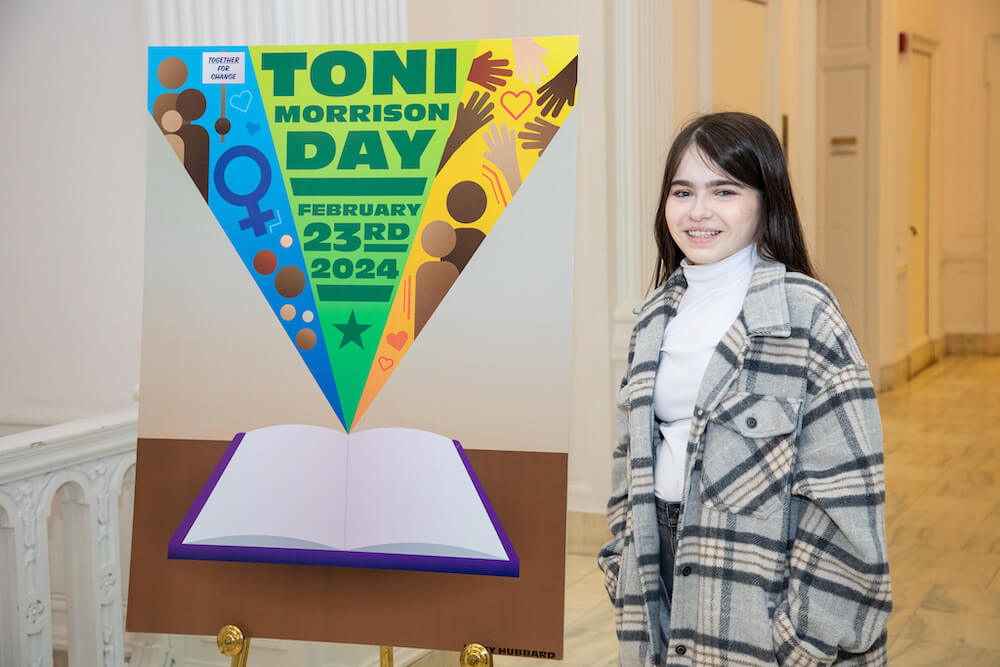
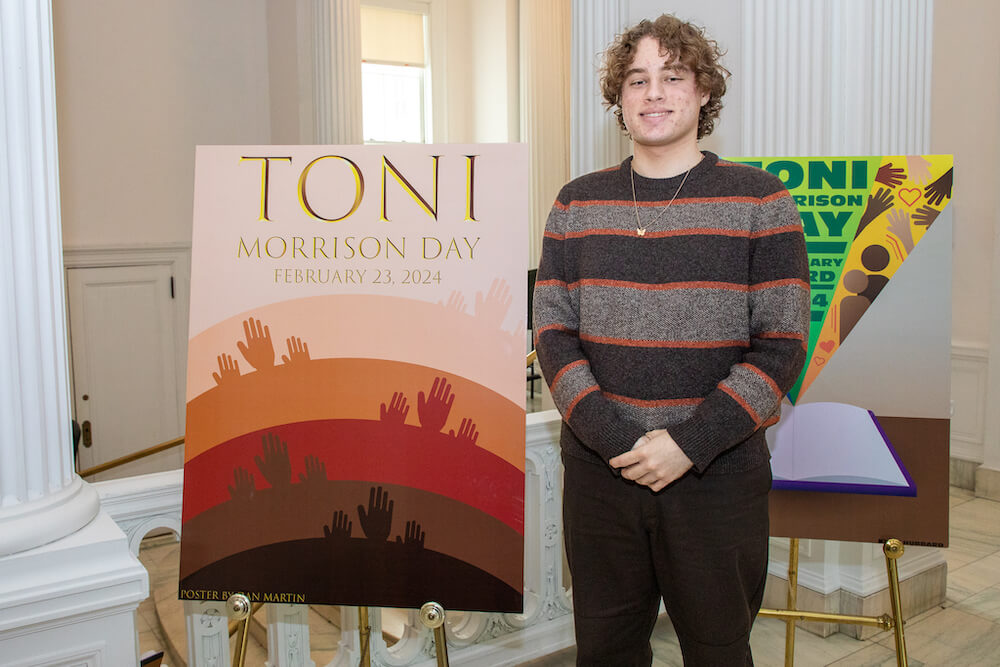
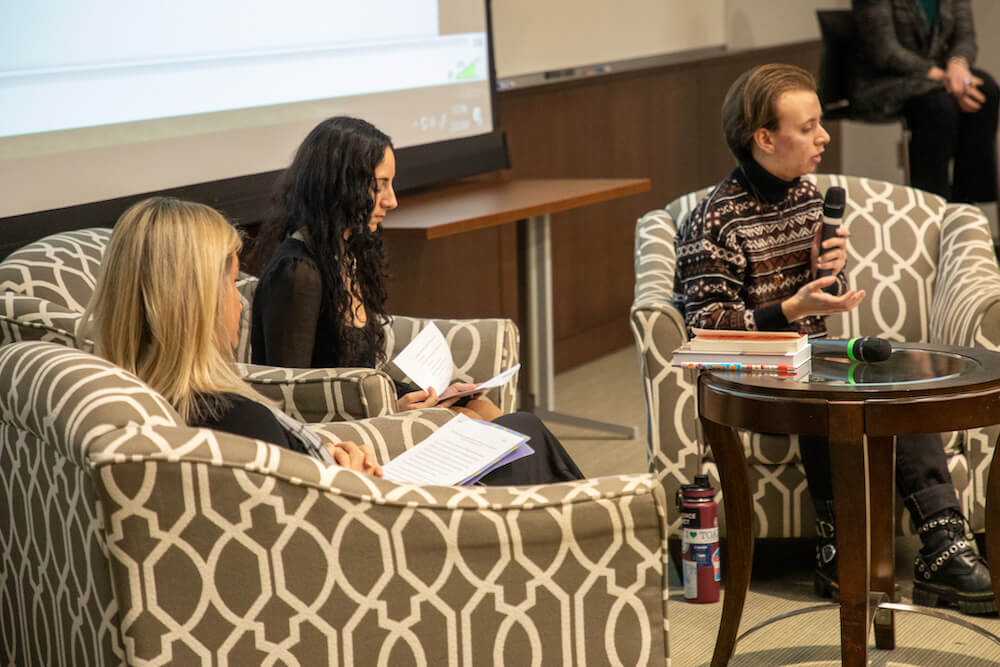
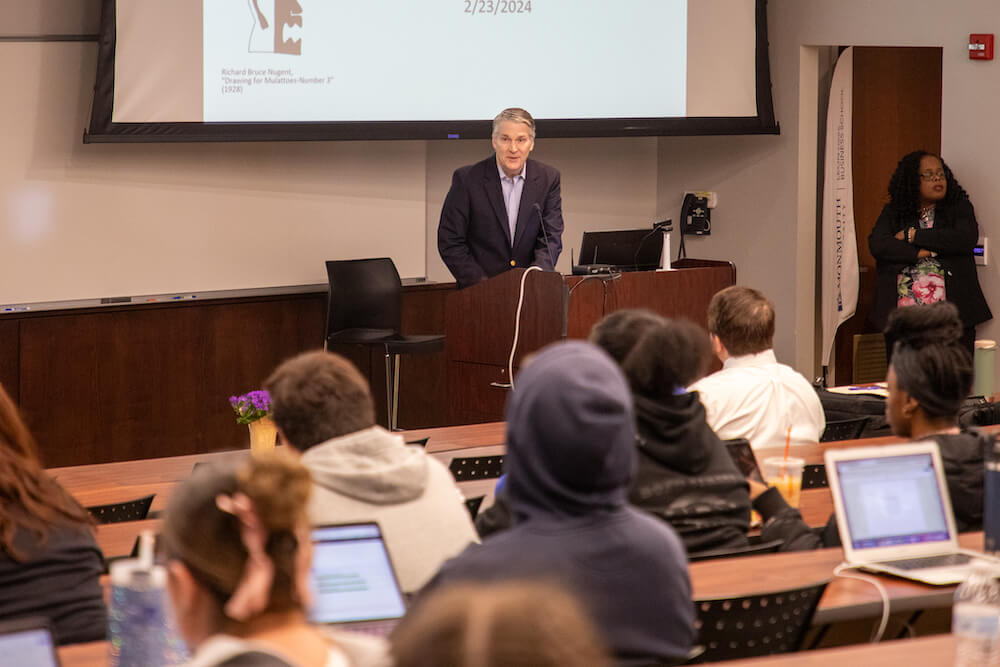
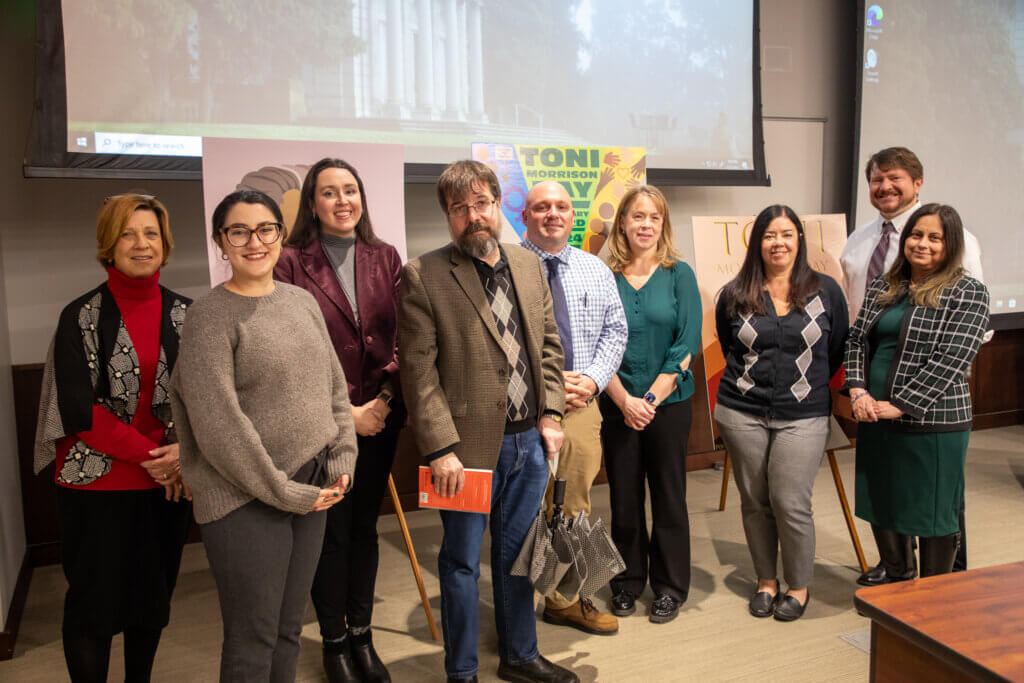
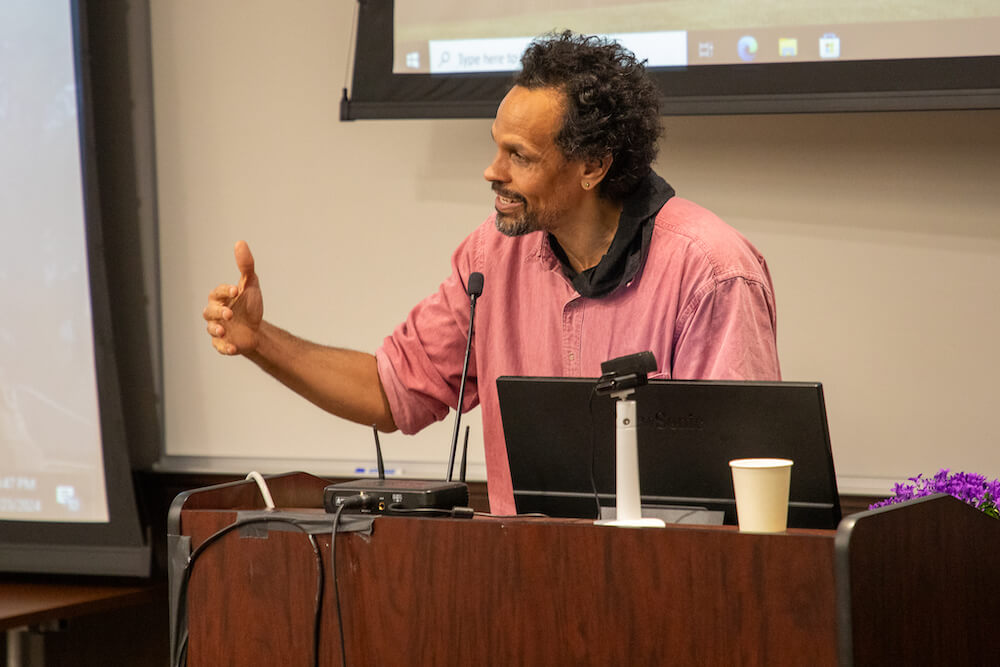
English Student Awards and Sigma Tau Delta Induction Ceremony
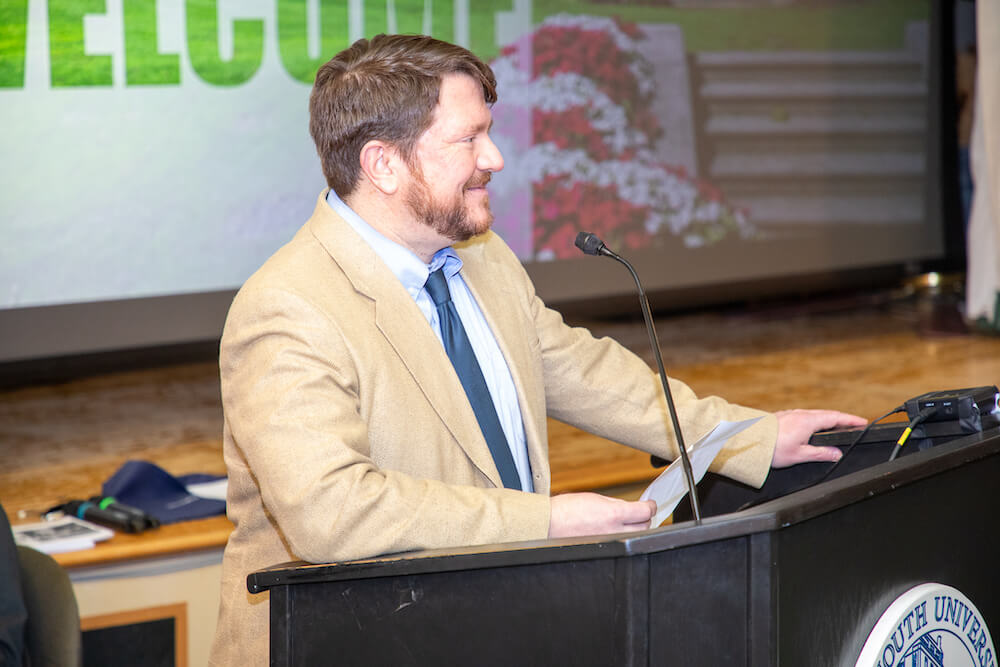
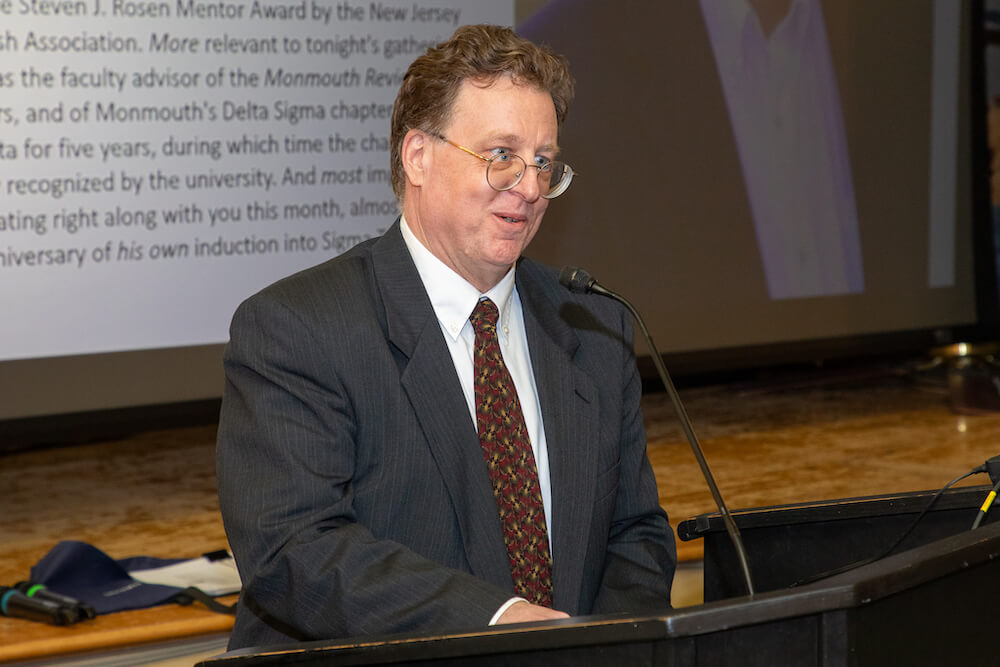
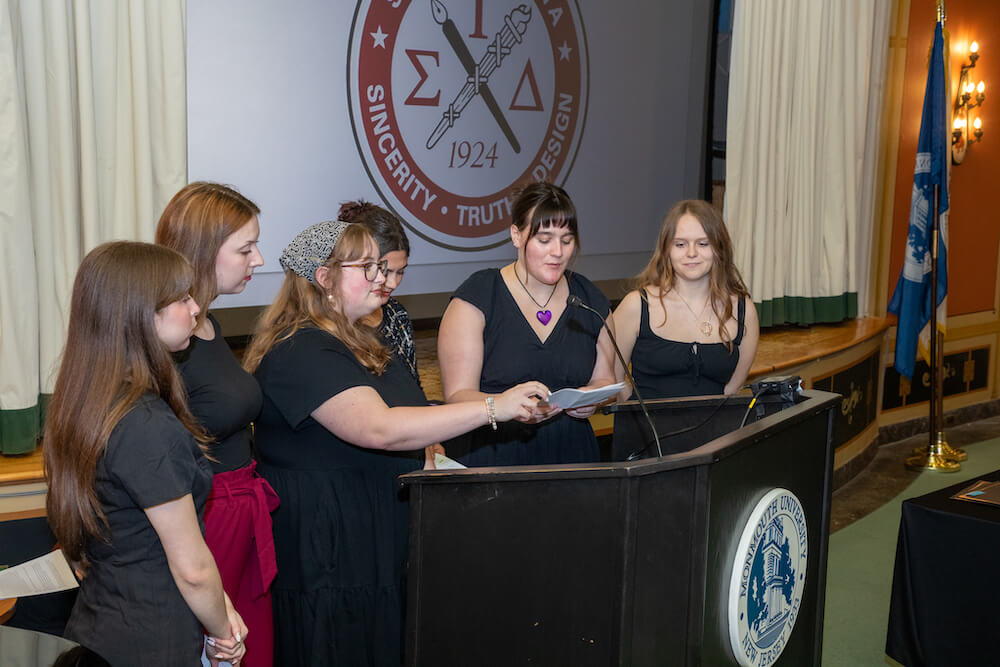
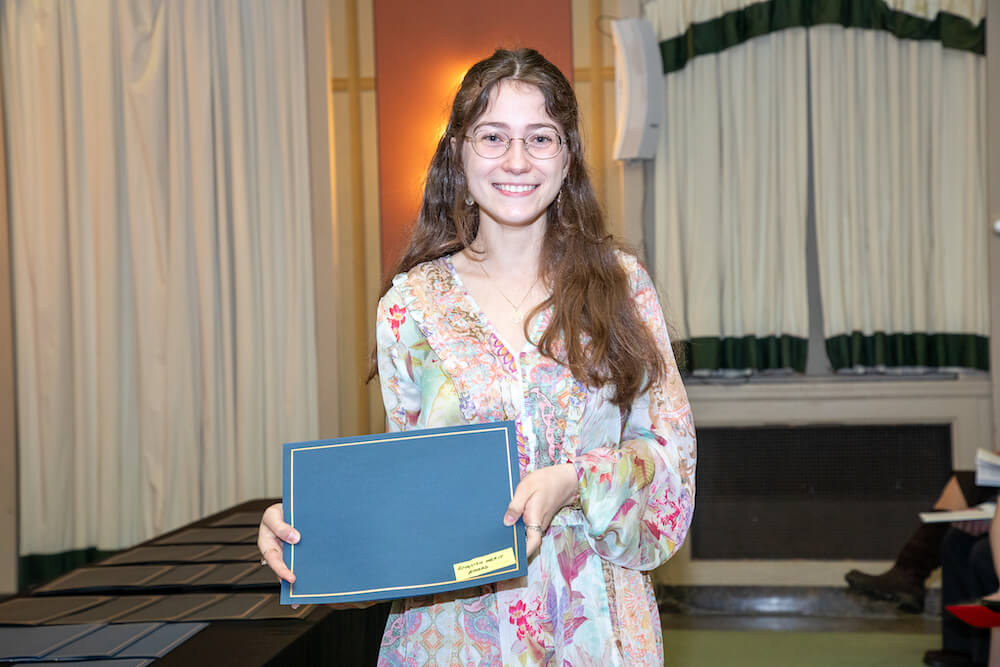
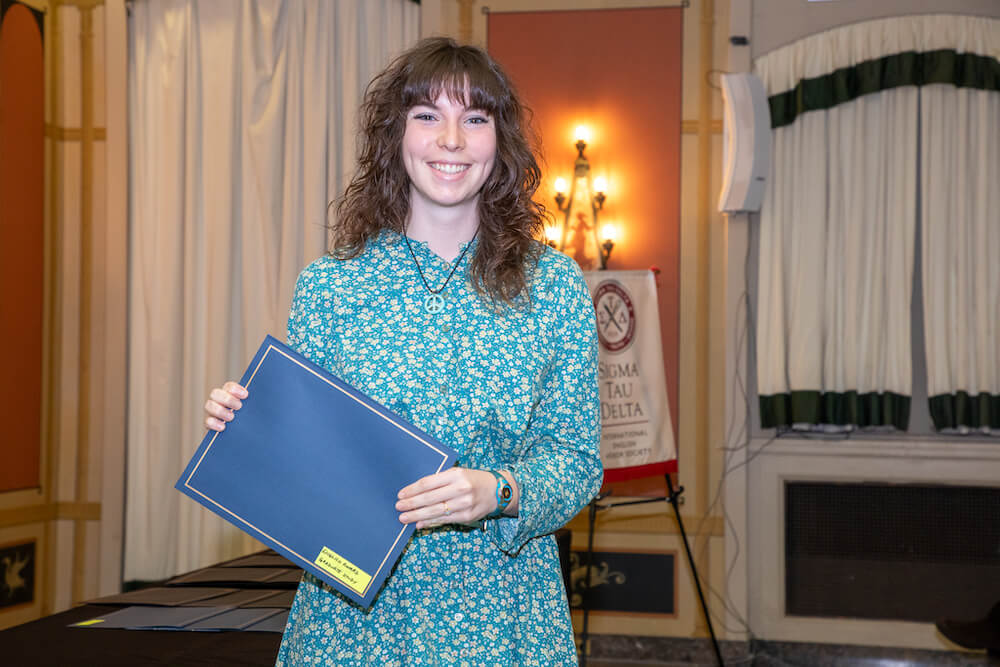
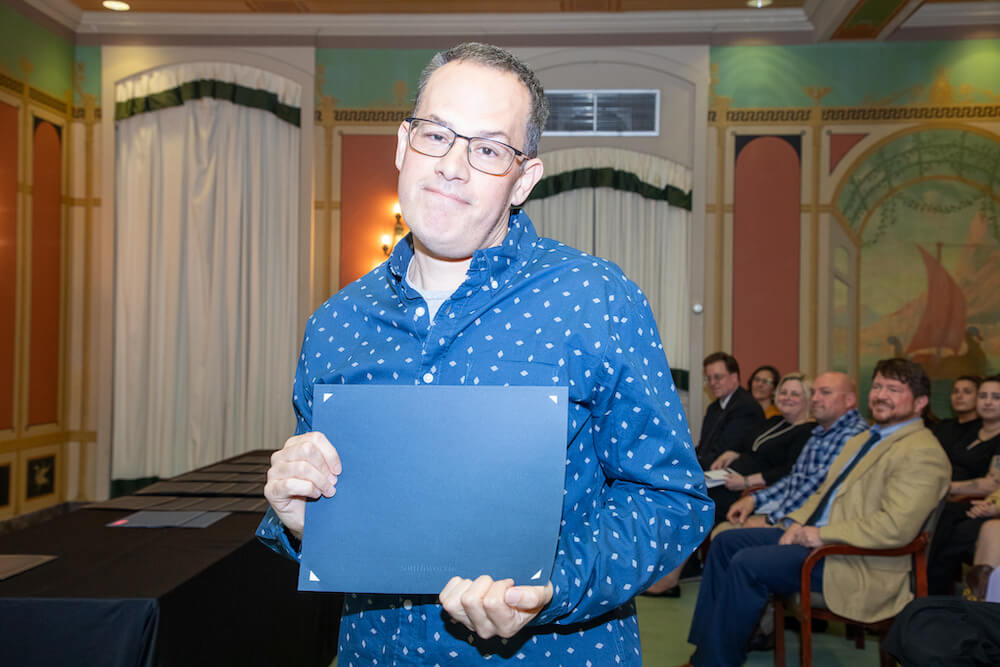
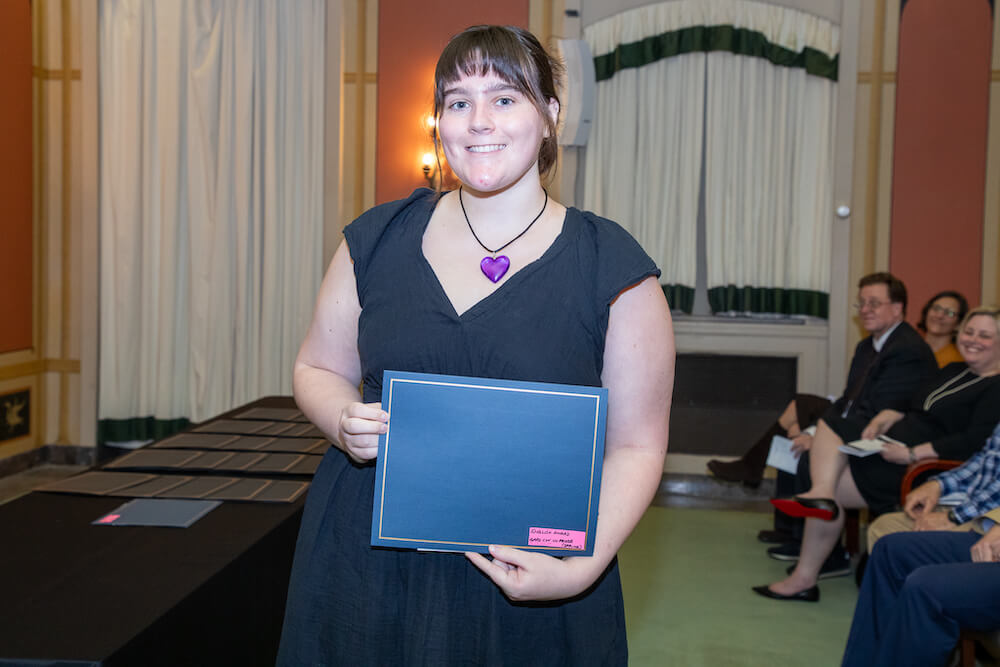
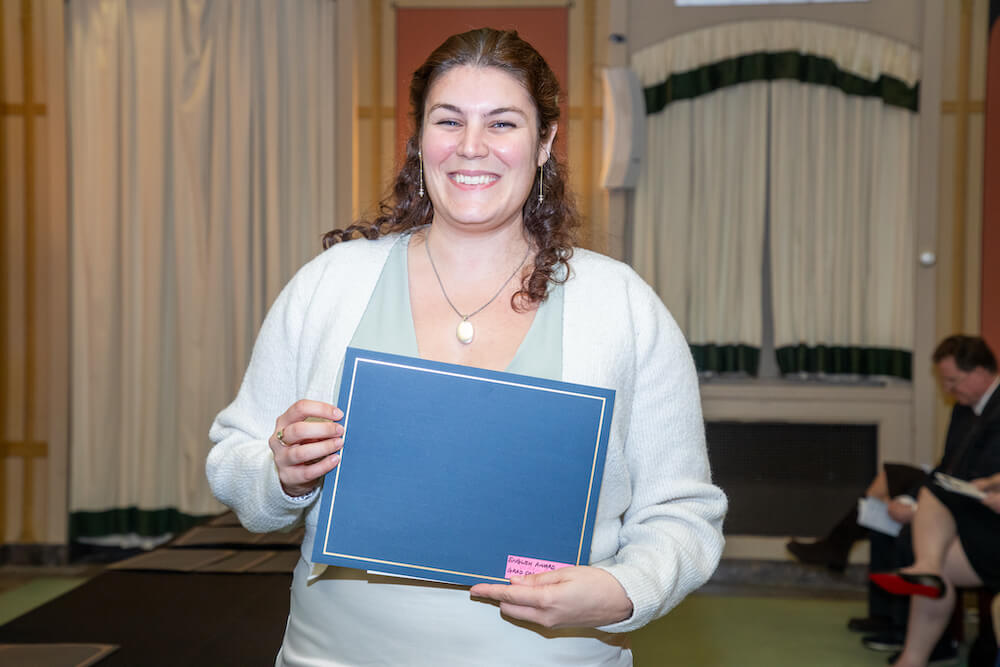
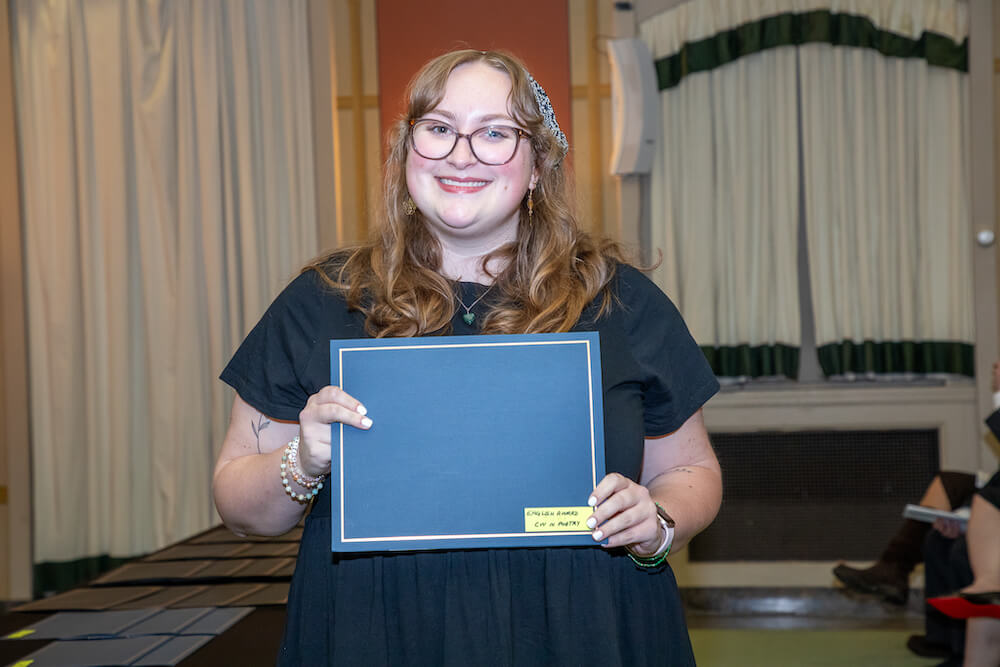
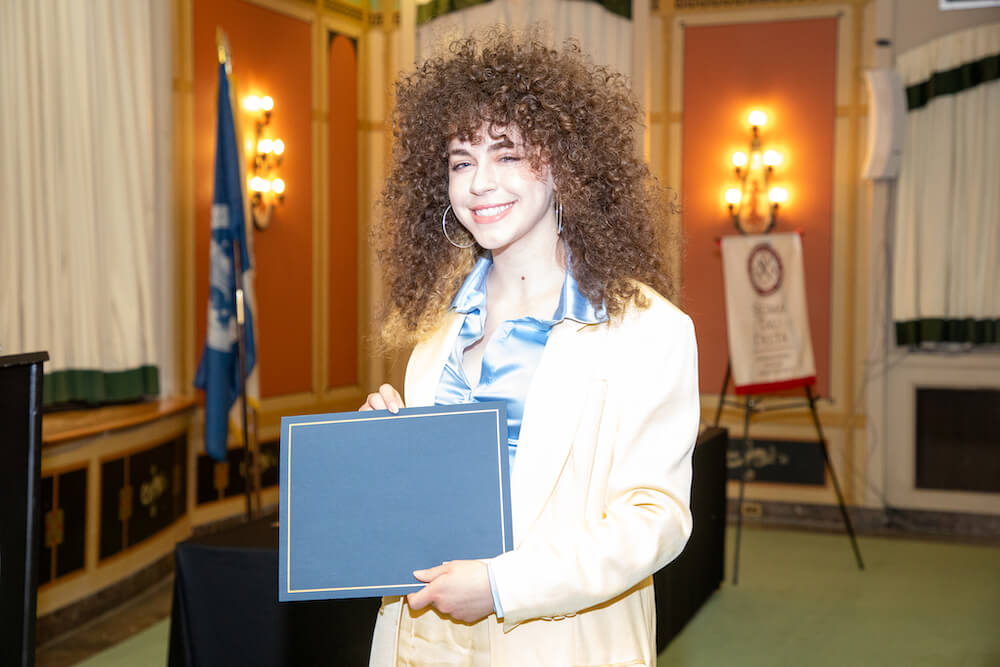
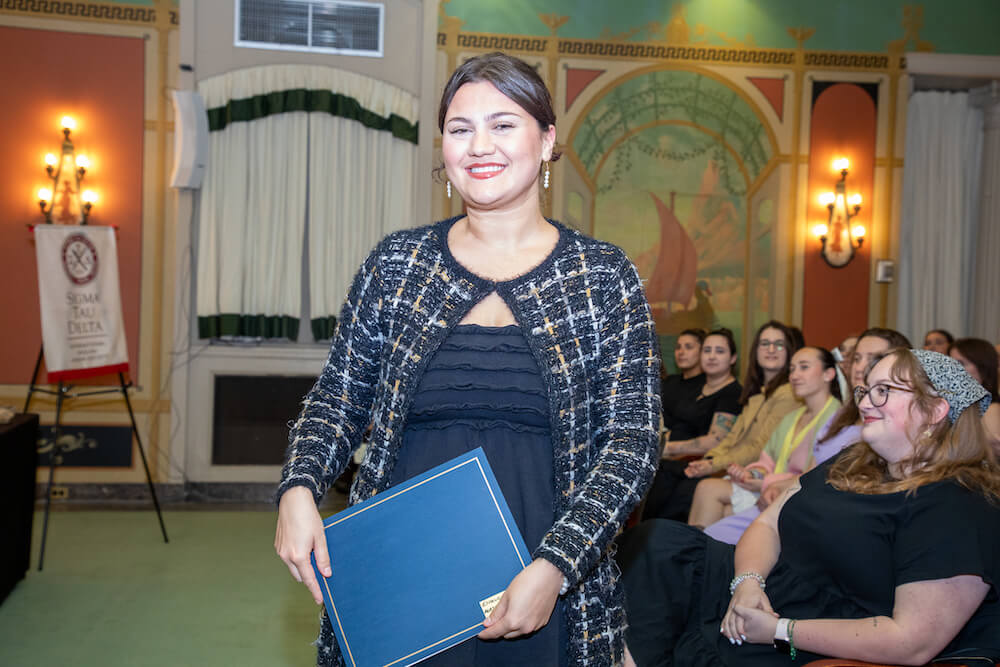
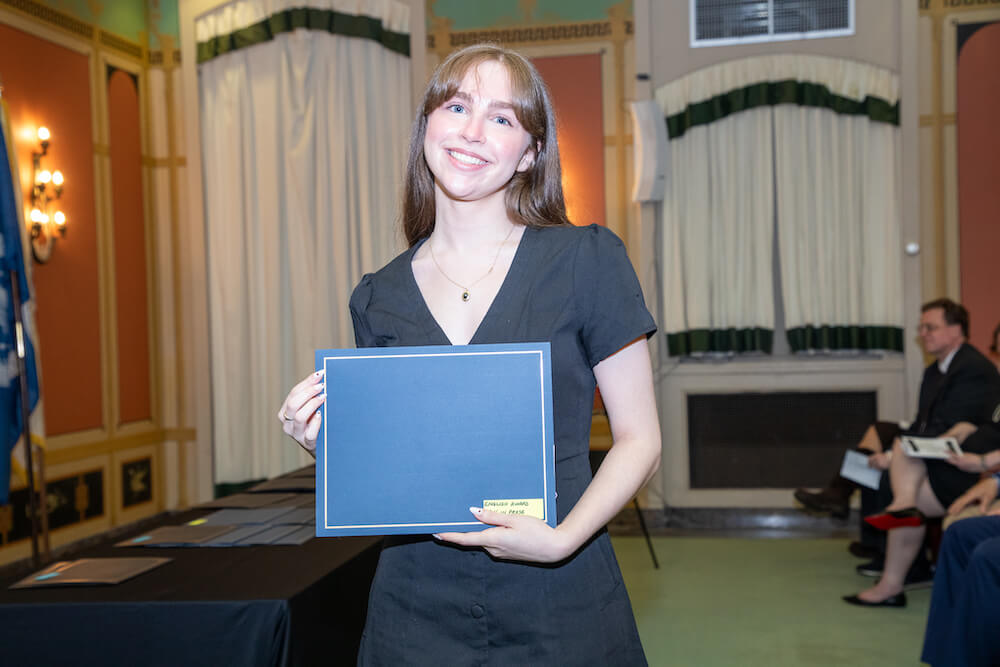
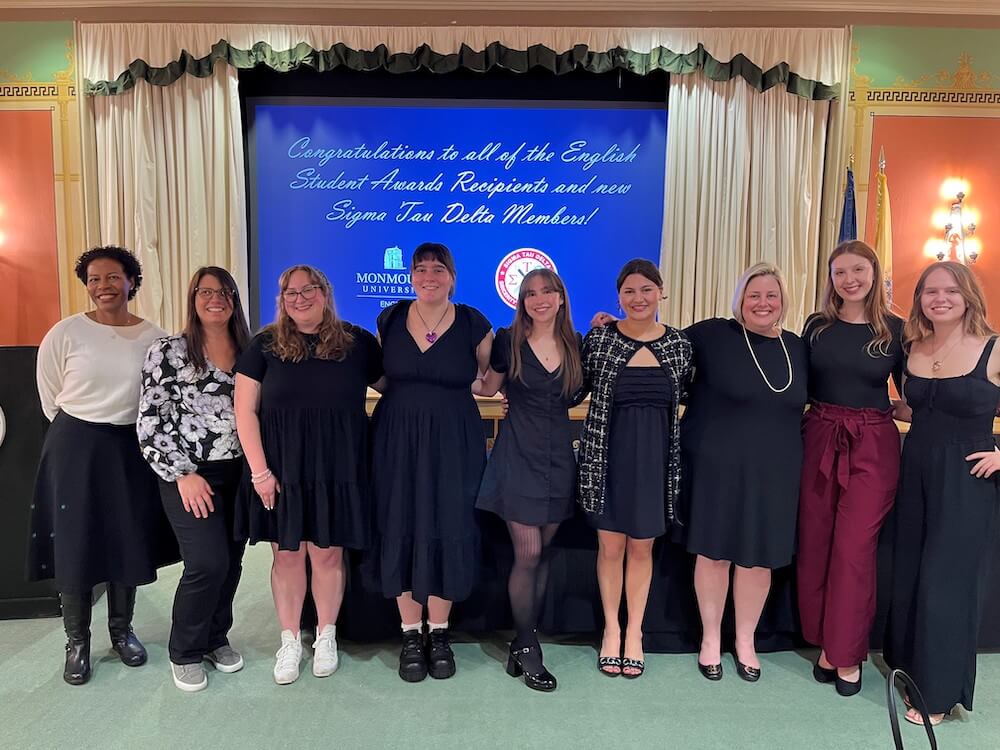
M.A./MFA Students @ Lakehouse Recording Studios
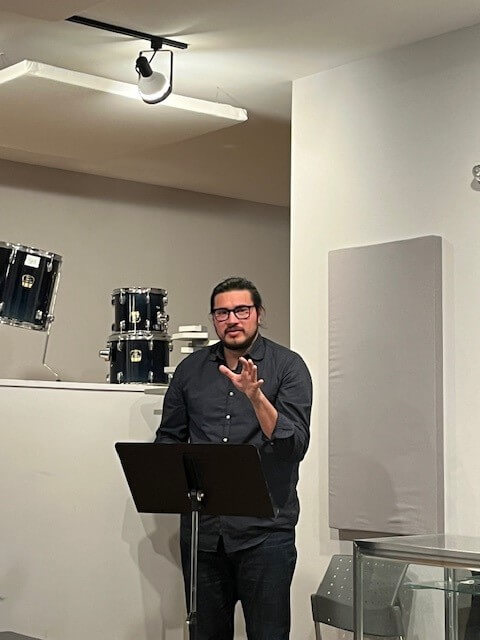



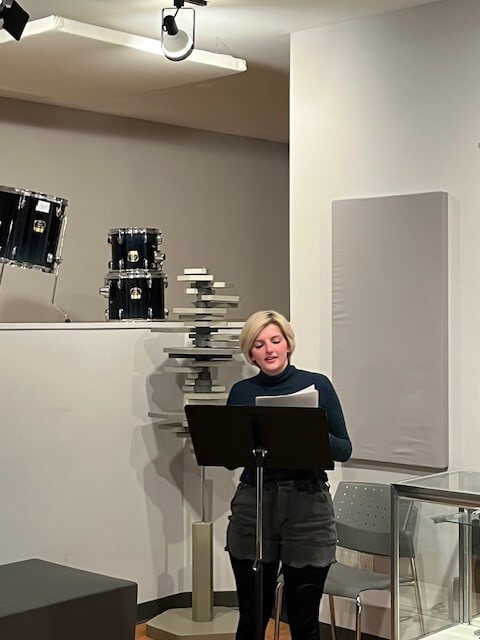

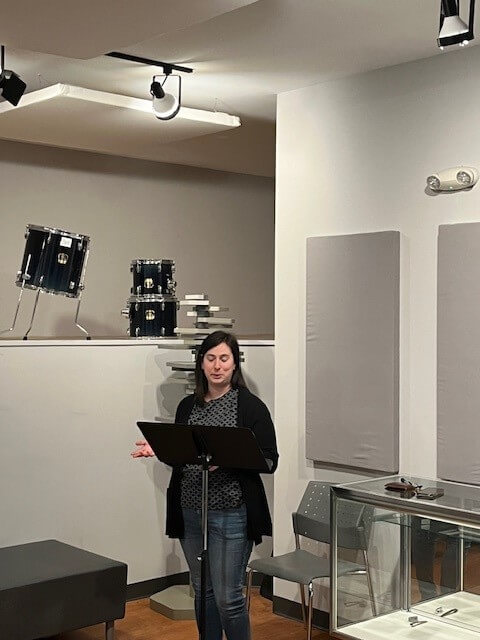
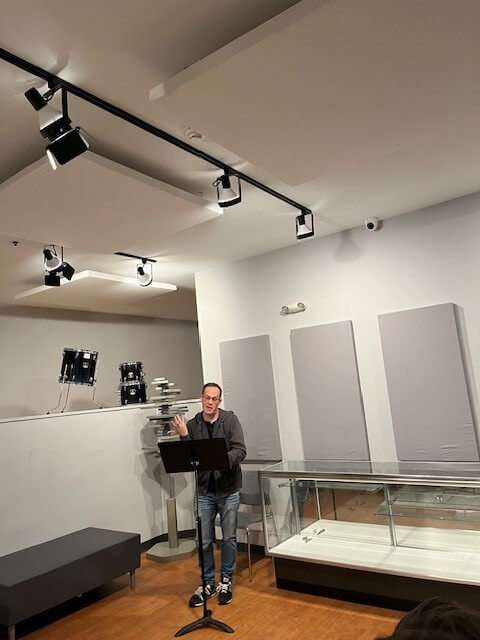
Snapshots from Spring 2024 (Conference Presentations and Awards)

